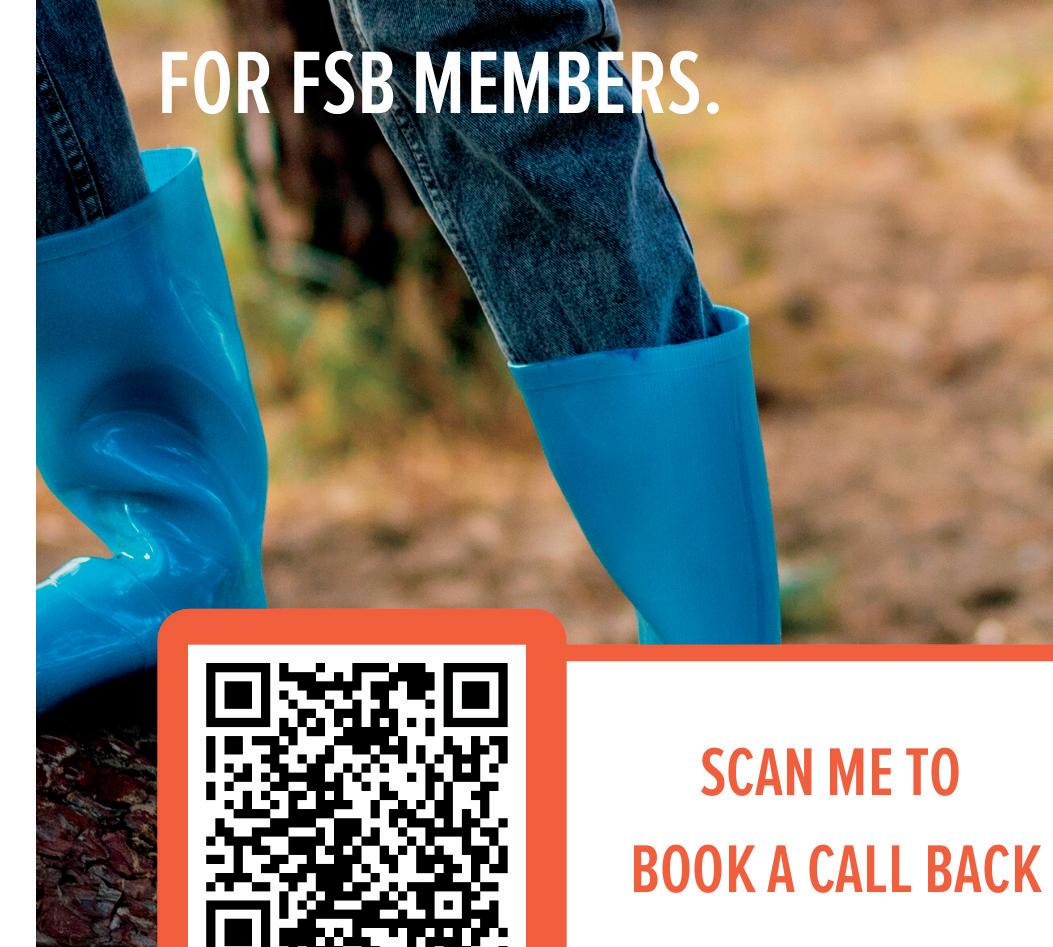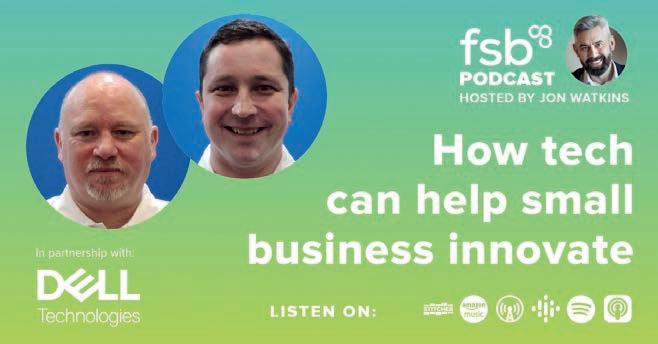
Under control
steps to keep your energy bills lower ENERGY COSTS | COST OF LIVING INTERNATIONAL TRADE OCTOBER-JANUARY 2023 DRIVING BUSINESS AMBITION FIRSTVOICE.FSB.ORG.UK | OCTOBER-JANUARY 2023 COST OF LIVING Helping staff when wage increases aren’t an option INTERNATIONAL TRADE How small firms are responding to Brexit MARKETING The importance of smart and efficient promotion
Practical

The first truly joined-up approach to employee health, safety, and wellbeing for SMEs BT201 •Flexible health, safety and wellbeing solutions tailored to your needs •Unique tools to benchmark your organisation •Access to industry leading HR, health, safety and wellbeing tools •Advice and support from industry experts to help you every step of the way. Helps you build a healthy, profitable, and sustainable future for your company. Sign up now: www.beingwelltogether.org support@beingwelltogether.org T. +44 (0)20 8600 1060
first steps
18 Under control
Penelope Rance reports on how hard-pressed small firms can help to mitigate the skyrocketing price of energy through smart costcontrolling measures and improved energy efficiency

24 Making ends meet
Staff will be struggling with the cost-of-living crisis, and yet many businesses are not in a position to raise wages; Peter Crush suggests other ways employers can help
28 Big picture
Adapting to post-Brexit trading
30 Fresh dawn
Brexit has made it more difficult for firms to trade with countries in the EU, says Alex Wright – but many are making a success of it, or even pivoting to alternative markets

34 Deep dive
Finding affordable and adequate insurance is proving to be yet another headache for small business owners

october-january 2023 | firstvoice | 3 heads up 6 Need to know Government package promises fixed energy costs for six months; public electric vehicle charging takes off; new legislation aims to boost local economies in Scotland 9 Data centre Rising costs and labour shortages bite small business 10 Regional voice Round-up of regional news 13 Opinionated Tina McKenzie on supporting skills, Perry Power on mental health and Marcus Herbert on employee wellbeing advice 36 How to ...Develop a wellbeing culture; Create effective video content 40 Legal With demand for staff greater than the available supply, what should employers be mindful of during the hiring process? inside firstvoice.fsb.org.uk
features
Marketing
straitened
importance
My journey
on his classic car firm with a difference
Ask the experts Challenging restrictive covenants and lockdown rents
news Photographer makes work out of a hobby, and a brewery whose beer leaves a better taste than most 52 Awards Enter the FSB Celebrating Small Business Awards 2023 54 Member services Making crucial connections through FSB events 56 My business Sharon McDermott’s legal firm specialises in wayleaves OCTOBER-JANUARY 2023 6 36 30
42
In
times, marketing retains its
46
Richard Morgan
48
member spotlight 49 Member
tech

Publisher: Aaron Nicholls
Editor: Nick Martindale
Email: firstvoice@redactive.co.uk
Lead designer: David Twardawa

Picture researcher: Claire Echavarry
Sub-editor: Kate Bennett
Production: Aysha Miah-Edwards
Email: aysha.miah@redactive.co.uk
Advertising Email: fsb@redactive.co.uk

Tel: 020 7324 2726
AS SMALL BUSINESS OWNERS, WE ALL know there are things that come along that can keep us awake at night. But the cost-of-doing-business crisis, which has come to a crescendo in recent months –energy costs, inflation, the highest tax burden for decades – is the most toxic combination in my 35 years of running businesses. And it comes off the back of the pandemic, when many small business owners’ reserves were wiped out.
Without support, the impact was starting to look bleak – small firms downsizing, mothballing, or even closing for good as the figures stopped stacking up and the scale of price rises needed to offset these soaring costs simply pie in the sky. Pizzerias which would need to charge £25 for a 9” thin crust pepperoni; pubs which would need to pump up prices to £10 a pint; manufacturers seeing exorbitant hikes in bills which couldn’t be passed on.
It’s times like this when standing together as small business owners to make our voice heard collectively is crucial. FSB has been shouting from the rooftops for months to succeed in getting this to the top of the media agenda, making clear that you can’t solve the cost-of-living crisis without tackling the cost-of-doing-business crisis. Behind the scenes, we’ve been making your voice heard loudly with political decisionmakers across the UK. As a result, we managed to secure help for small businesses on energy bills, plus other wins on reducing the tax burden – including a reversal of the hike in National Insurance.
It’s still going to be a tough winter, but these measures will be a lifeline for many, and FSB will continue to campaign to secure an environment in which entrepreneurship can flourish and drive economic recovery.
Follow Martin on Twitter @MMcTagueFSB





First Voice is available on subscription at £42 per annum. For details, contact publications@fsb.org.uk

First Voice has an audited net average circulation of 112,657 (July 2021 to June 2022).
AccessAbility help. If you require this document in an alternative format, please ring 01253 336036 or email: AccessAbility@fsb.org.uk

Printed by Warners First Voice is published on behalf of the Federation of Small Businesses (FSB) by Redactive Publishing Ltd (Tel: 020 7880 6200) firstvoice.co.uk | redactive.co.uk 4 | firstvoice | october-january 2023 firstvoice.fsb.org.uk
bits 58 New kit and apps
best new gadgets and apps for small businesses 60 Digital voice Our pick of First Voice’sonline and social media content out of office 62 I could try... ...Archery 64 Downtime Pottery, ski-free winter breaks and vintage cameras last word 66 Guy Browning Why self-knowledge is essential for the SME owner MARTIN McTAGUE, NATIONAL CHAIR 62 This edition of First Voice went to press on 30 September. All information is correct as of that point. inside october-january 2023 first word We hope you enjoy reading this edition of First Voice which you receive as part of your membership with FSB. We'd like to ask you to please consider the environment when you've finished reading it and pass it on to colleagues, friends, family or your business associates to have a read too before recycling it. FSB takes the privacy and protection of your data very seriously, and if you would like to find out more about this, please visit www.fsb.org.uk/privacy. If you would prefer not to receive the magazine at any time, please contact Customer Services on 0808 20 20 888 or by email to customerservices@fsb.org.uk Federation of Small Businesses Registered Office: Sir Frank Whittle Way, Blackpool, Lancashire, FY4 2FE. VAT No. 997 3427 63. The National Federation of Self-Employed and Small Businesses Ltd (FSB) is registered in England, number 1263 540. While every care has been taken in the compilation of this magazine, errors or omissions are not the responsibility of the publishers or of the editorial staff. Opinions expressed are not necessarily those of the publishers or editorial staff All rights reserved. Unless specifically stated, goods or services mentioned are not formally endorsed by FSB, which does not guarantee or endorse or accept any liability for any goods and/or services featured in this publication. ISSN 2399-5467 Copyright: FSB Publications Ltd This copy of First Voice magazine, and the paper envelope it was delivered in, are 100% recyclable FSB Publications: Email: publications@fsb.org.uk Tel: 0808 20 20 888 fsb.org.uk FSB Editorial Director: Alan Soady E ALL long But s he ers’ reserveswerewipedout. R
The





















ORG ID REGISTERED ORGANISATION
heads up
Most valued work perks revealed
Being paid for overtime is the most valued employee benefit for UK staff, according to a study by Remote.
Energy price relief welcomed


FSB HAS WELCOMED THE move by the Government to provide greater clarity around the support that will be provided to help firms cope with energy costs, but warns that small firms must not fall through the cracks.


Under the package, gas and electricity prices will be fixed for six months from 1 October, and are expected to be around half the level that was previously predicted.


Tina McKenzie, Policy and Advocacy Chair, said: “This is a substantial move and will likely be of considerable help to small firms which have been crying out for months for measures to limit the pain caused by spiralling energy prices. The next stage will be for small businesses to learn what the changes mean for their current
1 d y

contracts and for any offers they have been looking at.”

Despite the move, FSB is warning that some businesses may still fall outside the current support and of the risk of a cliff-edge at the end of the six-month period.
“There will be hardship for some businesses which signed fixed contracts after prices rose but before April, who find themselves excluded from the scheme,” said Ms McKenzie. “FSB calls on energy suppliers to allow those customers to switch without charge to new fixed contracts, covered by the Energy Supported Price, if that makes the difference for small business to survive.”
See our feature on coping with energy costs on page 18
The research found 79 per cent of UK workers ranked overtime pay in their top fi ve work benefi ts. This was followed by fl exible work hours (77 per cent) and a company-sponsored retirement plan or pension (75 per cent).








Other popular measures include early finishes on Fridays (65 per cent) and a four-day working week (64 per cent), while private medical insurance came ninth on the list, with 58 per cent putting it in their top five.
TAX
NICs and tax reversal as Government hears FSB’s voice
In September, the incoming Government heard FSB’s campaign to reverse April’s National Insurance contribution and dividend tax hike, which the Chancellor said will be reversed in November. This tax made it more expensive for small business owners to pay both employees and themselves, as well as making it more expensive to start up as self-employed.
3 2 firstvoice.fsb.org.uk 6 | firstvoice | october-january 2023 9 THINGS YOU NEED TO KNOW
BENEFITS
ENERGY
Ten-year switch for new entrepreneurs
THE AVERAGE SMALLBUSINESS owner started up after working in a previous job for a decade, according to research by GoDaddy.

The study found that 70 per cent of entrepreneurs started their business in a different sector to that in which they had previously worked. The most common industries to move out of are retail (15 per cent), teaching and education (7 per cent) and accounting, banking or finance (7 per cent).
The most common reason for making the change was a desire for greater flexibility, cited by 41 per cent), becoming frustrated at working for someone else (36 per cent), fulfilling a lifelong dream (35 per cent) and a desire to earn more money (30 per cent).
The pandemic has also had an impact, the survey found, with 17 per cent saying Covid-19 had made them re-evaluate their life and a further 10 per cent launching a business after being made redundant.
EV charging spreads to retail and work premises
A trend towards charging electric vehicles (EVs) in public spaces or work environments is emerging, according to a survey by YouGov on behalf of vehicle charging firm CTEK.
With more people owning EVs, the survey suggests just 56 per cent of people now rely on their home charging point, down from 78 per cent in 2021.
People are also using shopping centres (20 per cent), work charging points (20 per cent), hotels (11 per cent) and restaurants (8 per cent).
The study also found that 25 per cent of EV users say lower running costs are the main benefit, with 21 per cent attracted by environmental benefits. But more than half (51 per cent) admit to having range anxiety.
BILLS
Late payment costs small firms dear
More than half of small business invoices are paid late, with the average bill being settled 5.8 days after it is due, according to research by Xero and Accenture.
The report found 49 per cent of small business invoices are paid late, with a delay of more than a month in 12 per cent of cases. Xero estimates this costs firms collectively £684 million a year.
The study also found that small business expenses rose by 18 per cent in 2021 due to supply chain disruptions, price shocks to commodities like oil, and
general inflation. This was a marked difference to 2020, when expenses actually declined by 1 per cent.
The report recommends that small firms consider adopting online invoice payment options for faster payment, and work with their accountant to stay on top of government programmes that offer payment plans to help smooth expenses.
“Late payments threaten owners’ ability to meet their own obligations such as rent or wages,” said Rachael Powell, Chief Customer Officer, Xero.
Cecilia Routledge, Global Director, Energy & Facilities, for CTEK, said: “It is extremely encouraging to see that the availability of public and destination charging facilities is starting to step up to meet the growing demand for out-of-home charging, as this is a vital factor in the overall acceptance and take up of electric motoring.
“However, reliability of out-of-home charging remains an issue, and this is an aspect that needs additional focus, along with steps to reduce the complexity of payment and industry-wide commitment to rolling out EV roaming.”
4 5 october-january 2023 | firstvoice | 7 heads up need to know
STARTING UP ENVIRONMENT 6
Local focus to help Scottish firms
EW LEGISLATION ONTHEWAY
Nin Scotland has the potential to boost communities and give local businesses a fairer crack of the whip when bidding for public contracts.
The Community Wealth Building Bill – which aims to fire up local economies by getting local institutions such as councils, universities and hospitals to work together to combine and unleash their economic power – could be an ideal vehicle to enact a number of long-standing FSB policies in areas such as procurement and local economic development.
Ahead of a consultation on the plans being launched, the Minister in charge of the Bill, Tom Arthur MSP, met FSB members to hear their first-hand
experiences of the procurement system and their suggestions for change.
Colin Borland, FSB’s director of devolved nations and also a member of the Bill’s steering group, said: “We need to extract the maximum local economic and community value from the £13.3 billion the Scottish public sector spends buying goods and services every year.
“This bill will be an ideal opportunity to do just that. But it won’t deliver unless it fully involves the microbusinesses who account for 70 per cent of our business population, yet win only about 5 per cent of public contracts by value. That means more place-based procurement strategies and local buyers who are empowered to adopt creative approaches in sourcing goods and services.”
Call for board directors
FSB is inviting expressions of interest to join its board of directors in 2023. This is an exciting opportunity for members to play a key role in FSB’s work to support small businesses, by leading and influencing overall strategy and the promotion of its long-term sustainable success for the benefit of the members.
There are also national volunteer opportunities, which may appeal to those
Report urges Wales tourism push
A report by FSB Wales has called for more to be done to help develop the distinctiveness of the Welsh brand and encourage UK and international tourists to visit.


As rising costs dampen business confidence across the country, FSB is calling for a post-peak Covid-19 ‘Welcome to Wales’ marketing campaign to help boost the economy and small businesses. Among the measures suggested is the need for an assessment to complement the debate about a proposed St David’s Day Bank Holiday, which has cross-party support in the Welsh Parliament. In the report, FSB calls for an analysis of the economic benefits and impact of a potential bank holiday.
Ben Francis, FSB Wales Policy Chair, said “Especially in rural communities in Wales, tourism underpins the economy, providing employment opportunities and enriching our landscape. In 2019, over a million international travellers visited Wales, adding an estimated £515 million to our economy.
with an interest in risk management and collaborative scrutiny of processes.
FSB is particularly keen to hear from members from minority and under-represented groups as it strives to be a truly inclusive organisation that recognises and celebrates diversity. Members who would like more information can email fsb.governance@fsb.org.uk
“There is much more we can do to grow the sector, its contribution to the economy and its role in profiling Wales to the world. It’s time to get the ‘Welcome to Wales’ message out there, to protect and redefine what it means to visit Wales.”
FSB Wales is asking people to share their favourite spaces and places in Wales, including their favourite small business in the tourism space, using the hashtag #MyHiddenGemFSB on social media.
9 heads up need to know
LEGISLATION firstvoice.fsb.org.uk 8 | firstvoice | october-january 2023
7
TOURISM
8
VOLUNTEER
heads up in-depth
data centre
Rising costs and labour shortages start to bite
Cost concerns have led to falling confidence, according to FSB’s Small Business Index.
The combined 53.4 per cent of small firms that predict they will stay the same size (38.7 per cent) or downsize or close their business (14.7 per cent) in the coming 12 months outweighs the 46.6 per cent who predict they will grow.
There was a better outlook for businesses in information and communication, where 63 per cent of businesses expected to grow, compared with 35 per cent of hospitality businesses and 34 per cent of wholesale and retail firms.
Nearly nine in 10 firms say their costs are higher now than 12 months ago – the highest proportion on record. The most common causes were fuel and utilities, both cited by 64 per cent.
The second quarter of 2022 also saw the number of small firms taking on more employees (11 per cent) outnumbered by those that shrank (14 per cent). However, 7 per cent believe their employee base will grow in the third quarter.
Confidence fell from 15.3 in the first quarter of 2022, to -24.7.
SMALL BUSINESS CONFIDENCE BY SECTOR
SMALL BUSINESS INDEX SNAPSHOT
34%
The proportion of small firms that have resorted to reducing operating hours to save money on electricity, according to a study from Disruptive Technologies
76%
The amount of small firms that have changed their business plan in the last two years in response to changing circumstances, research by Oracle Netsuite finds
40,000
The number of small firms that have sought finance to cope with rising costs, equating to around one in seven, a Nucleus Commercial Finance survey finds
october-january 2023 | firstvoice | 9 firstvoice.fsb.org.uk
CONFIDENCE
Most confident Least confident SMALL BUSINESS CONFIDENCE BY REGION -5 -6 -34 -39 -65 -70 -60 -50 -40 -30 -20 -10 0 QUICK FIRE STATS Q3 2021Q4 2021Q1 2022Q2 2022 -8.5 +15.3 -24.7 25 20 15 10 5 0 -5 -10 -15 -20 -25 -30 +16.4 69Information and communication Accommodation and food service activities Construction Manufacturing Wholesale and retail Professional, scientific and technical -32 -39 -32 -16 -27 -10 -43 -17 -24 -14 -29
regional voice
ROUND-UP OF REGIONAL NEWS
MIDLANDS
New project to focus on skills needs
NORTHERN IRELAND
FSB NI meets Small Business Commissioner over late payments
FSB NI has welcomed the Small Business Commissioner’s commitment to do all she can to deal with late payments and help firms in Northern Ireland whose financial wellbeing is suffering as a result. Sixty per cent of small businesses have problems with late payments, and the pandemic has made it worse.
During its first meeting with Commissioner Liz Barclay, FSB NI outlined the need to change the payment culture that harms businesses in Northern Ireland. It also shared a series of proposals that aim to address problems with the prompt payment system and incentivise customers to pay early in Northern Ireland.
FSB is calling for the creation of a Prompt Payment Champion in Northern Ireland, who would report on the payment performance of the public sector and large businesses and make recommendations for improvement.
Small Business Commissioner Ms Barclay said: “Meeting with FSB Northern Ireland underlined to me the big impact that late and poor payment practices have across the UK. As the cost of doing business rises and skills are in shorter supply, it’s more important than ever that small suppliers are paid quickly and fairly.”
FSB NI is developing a report that will outline how the private sector and every level of government can take the right steps to ensure that small businesses get paid much faster.
FSB is to lead a new project looking at future skills needs of businesses and technical education provision in three areas of England, including a large part of the East Midlands. By working with local employers and key education providers, this project will seek to set out the key priorities and changes needed to make post-16 technical education or training in the area more closely aligned with the skills needs of local employers and local economies.
The Local Skills Improvement Plans (LSIPs) are an initiative funded by the Department for Education, which has selected FSB as the lead employer
SCOTLAND
representative body to head up the LSIPs in Lincolnshire, Derbyshire & Nottinghamshire, and Cornwall.
FSB will be holding a series of events during the autumn in conjunction with employers and education and training providers in these areas. This will influence the recommendations of a report for each area to be completed by mid-2023.
FSB National Chair Martin McTague said: “We look forward to working alongside employers, key education providers and local stakeholders to help shape the future skills and local provision in these areas of England.”
Single use plastics banned in Scotland
Businesses in Scotland are now banned from supplying single-use plastics such as plastic forks and polystyrene boxes. The new rules – in force from August – were delayed following a dispute between the UK and Scottish governments. While FSB research shows that many small businesses have taken action to reduce waste, FSB is arguing for understanding as the rules bed down.

A spokesman for FSB said: “Given the confusion associated with the implementation of these new rules, we’d urge councils enforcing the new regulations to initially take a lenient approach.
“Between recovering from the Covid crisis and dealing with spiralling overheads, a huge number of small businesses already have a lot on their plates.”
More information can be found at zerowastescotland.org.uk/single-useplastics/regulations

10 firstvoice.fsb.org.uk 10 | firstvoice | october-january 2023 heads up area update
Night school offers business learning
A small business night school has been launched by FSB’s south-west England team, offering expertise and skills on a variety of aspects of business.
FSB pushes back against proposed ULEZ extension
FSB London has urged the Mayor of London to rethink the proposed expansion of the Ultra-Low Emission Zone (ULEZ), warning it will negatively affect too many small and vulnerable businesses.

It follows a survey conducted by FSB which found that 84 per cent of businesses oppose the proposal to expand the ULEZ in 2023, and 19 per cent were unaware of it.
FSB London is calling for:
Time to comply by having a similar lead-in period to previous zone extensions, including a ‘no charge’ period until at least 29 August 2024
An all-encompassing vehicle scrappage scheme for small businesses that can be supported by Government, Mayor of London and financial institutions providing low-cost finance
A project bank account for any small business paying the charge from August 2023 to August 2025, with funds protected in a TfL ULEZ bank account. Businesses would be able to use the funds towards purchasing a new or second-hand vehicle, subject to an upper limit.
Rowena Howie, FSB London Policy Chair, said: “FSB recognises the climate emergency and the commitment to move to net zero – but the Mayor must support the small business community through a ‘carrot’ and education approach to make greener decisions.”
SOUTH-EAST
FSB contributes to levelling up report
FSB in Kent has contributed to a new report on levelling up and its implications for the south-east of England’s small businesses.
The report, titled Financing the future –What does levelling up mean for South East England?, was published in July by the All-Party Parliamentary Group for the South East, and focused on small business and local government.
As an area hit hard by the economic impacts of Covid-19, levelling up the south-east is critical to ensure the long-term success of communities and small businesses across the region, and the UK more widely.
Tim Aker, FSB’s Development Manager for Kent, said: “A levelling up agenda must
include a strong focus on left-behind communities in the south-east.
“Making sure places in the south-east have much-needed care and attention is not only incredibly important to the region but to the UK economy as a whole.”
The modernisation of outdated infrastructure is a significant cause for concern in the region, with many towns and coastal areas ranked as some of the most deprived in the UK.
The report recommended that an effective policy of levelling up must focus on bolstering skills and businesses in the area in order to ignite long-term economic success.
Sessions will include topics such as marketing and public relations; social media; understanding your accounts and cash flow; creating a strategy for your business; finding and converting leads; making your business greener; time management; and costing your products.
The virtual events are being held between 6.30pm and 8.30pm on a number of dates in October and November.
It follows the success of previous evening programmes that were run in partnership with the University of the West of England and Plymouth University, with some small business owners finding evenings easier than daytimes to fit them into their diaries.
Each session will have a maximum of 25 attendees, so that there is plenty of scope for discussion of individual issues.
FSB members attending the workshops benefit from a 50 per cent discount on the cost of taking part, with each session available for £15 to FSB members and £30 to non-members.
Further details can be found in the Events section of FSB’s website
SOUTH-WEST
heads up area update
LONDON
october-january 2023 | firstvoice | 11 firstvoice.fsb.org.uk
Photography: Alamy
CertCheck


Total confidence in accredited certification at the touch of a button.
Free-to-use online database for verification that organisations hold accredited certification to ISO standards, such as:















ISO 9001 (Quality Management)








































































































ISO 14001 (Environmental Management)








































ISO 45001 (Health and Safety Management)
Plus over 15 other international standards/schemes
Streamline your supply chain management and procurement processes now by visiting UKAS CertCheck today!





CertCheck.UKAS.com








UKAS is the National Accreditation Body for the United Kingdom. We are appointed by government, to assess and accredit organisations that provide services including certification, testing, inspection, and calibration.








































































FINDING TALENT IS NOT EASY for small firms, which must compete with big corporates. Finding the right talent is even harder.
As we emerge from the pandemic, small businesses are experiencing both labour and skills shortages. There are simply not enough people, and enough suitably skilled people, to meet business demand.
Our research finds small firms in England are held back by poor vocational skills provision in schools, challenges in accessing apprenticeships, and inadequate incentives to retrain and upskill.
Seventy-eight per cent of small firms are struggling to recruit the right people, with eight in 10 of those flagging a lack of qualifications, skills and experience. Sixty per cent say a lack of applicants is an issue.
Five in six small employers provided training for themselves and/or their staff in the previous 12 months. Only 26 per cent undertook leadership and management training in the same period.
Self-employed people, meanwhile, are held back from realising their business’s potential by a lack of encouragement to learn skills that are outside their core operations but are vital for growth. Four in five sole traders have no training plan, budget or relationship with a training provider. Two in five have not completed



Scaling up skills


Small firms are being held back by a lack of suitable talent, made worse by poor vocational provision in schools. The new Education Secretary must act now to develop the skills we need
any training or professional development in the past year. The skills of business owners and are central to running and growing a business. Aside from learning new skills, such as the development of new products or technologies, training improves competitiveness, efficiency and longer-term effectiveness. Keeping our skills up to date and learning new ones is indispensable in growing a business.
A forward-looking, cross-departmental labour market strategy is a pre-requisite to solving skills mismatches in the labour market. To address the challenges, we suggest a package of measures including:
and university or college leavers, with the winner receiving start-up funding; providing grant funding so all schools can offer programmes to encourage enterprise, such as Young Enterprise’s Company Programme; and ensuring young people have encounters with employers that reflect their local labour market by amending statutory careers guidance.
Maintaining the Apprenticeship Levy and government funding for apprenticeship training in small firms; revamping financial incentives to take on apprentices and host T Level placements; and providing apprentices with free bus passes.
Increasing the corporation tax relief for employers training low or mediumskilled employees, and introducing 50+ Skills Bootcamps to provide the skills older people require to remain in or re-enter the labour market.
Extending tax relief for sole traders who upskill or reskill to include training aimed at securing business growth, and widening rollout of the EnterprisingYou programme.
Establishing a legislative target that, by 2035, no young person in England should complete compulsory education without at least Level 2 qualifications. Threequarters of the working age population in England should have at least Level 3 qualifications, with at least two-thirds of working-age people in every English region qualified to this level.

Launching a nationwide young enterprise competition for school leavers
If the Government is serious about rebuilding the economy, our recommendations need to be on the new Education Secretary’s slate.
Skills and labour shortages are not limited to England: devolved nations are facing similar challenges. Only concerted, co-ordinated efforts between all relevant Whitehall departments and devolved governments can spur changes.
october-january 2023 | firstvoice | 13 firstvoice.fsb.org.uk heads up talent shortage
The skills of business owners and staff are central to running and growing a business
Sm su p m any a dev d staff a s sttaff groow w new skil new s new pro new p
TINA MCKENZIE is UK Policy and Advocacy Chair, FSB
Illustrations: Sam Kerr
TINA MCKENZIE
heads up mental health
THE SUCCESS OR FAILURE OF small businesses often comes down to the owner’s decisions. That can be a massive strain. Business can be lonely, especially in hard times. Add in the pressures of trauma, and it’s a wonder some people can even function.
I’ve been there. There was a time when my house had no furniture, I slept on the floor, and I halved my dinners with my dog… a tough time in entrepreneurship.
I had been trying to build businesses for five years. Wherever I turned there was another obstacle: debt collectors at my door, a clamp on my car, business expenses bouncing, thinking my business idea wasn’t needed within the market. I struggled to cope. However, no matter how pressured I felt, no matter how much I didn’t see a way out, I didn’t quit.
My mum walked out when I was four, leaving my dad to raise me. Growing up, I saw him work his ass off for little pay. My dad controlled me, in contrast to the parenting he experienced – his mum and step-dad were alcoholics who didn’t spare a moment’s thought for where their son was. The controlling, fearful relationship I had with my father caused me to develop a strong dislike for being ordered around.
When I took a job at a call centre in London, I found I needed permission to go to the toilet. I left. I decided to start my own business so I could manage my time and become a millionaire within a year. How young and naive I was!
I became a fitness coach, then ran a Facebook ads agency, then stepped into the world of personal branding before burning out. If you’ve ever experienced burnout, you’ll know it’s not great.






ter w much four, ng up, I pay. My he e um and n’t spare eir son onship around. tre in ssion to o start nage my within a as! n ran a ped into before erienced reat. couldn’t 10, I was randad for







Looking back, it’s because I couldn’t handle my ‘shit’. When I was 10, I was sexually abused by my step-grandad for over a year. Once he was caught, my dad stopped me from going round to his mum’s house and told me to keep quiet.

I lived in silence for 12 years. I wore mental masks and changed who I was because I was scared to be the man who was abused. Then, in 2017, my dad, who had become an alcoholic, had a heart




attack and died at 48. A year later I broke my silence to the world – my girlfriend, business networking meeting, Tik Tok – and found out he was a victim, too. Since then, I have worked more than ever before. I run two charities, have written a bestselling book, run a business, am working on a film, and haven’t burnt out once – not even close. Do I get a lot of pressure? Of course. But there are two differences. The first is knowing that I’m doing what I’m meant to be doing. I believe in my message and I believe in what I’m selling. Second, I removed my masks, began my healing journey, and started handling my ‘shit’. Have you been through a traumatic event that you’ve kept to yourself? You can nd help. Reach out to

me or to FSB Care, which can support your mental or physical wellbeing. If someone is showing signs of stress, ask them, “How are you?” – and don’t always take their first answer at face value.
event that you ve to your t help yourself, and find help. Reach out to help y am confiden some type o and don’t d your menta
I’m not saying you have to have gone through child sexual abuse to relate, but I dent that you have lived with some type of trauma. If you live in silence and don’t deal with it, it will spill over into your mental health and business.
We can’t outrun our demons. We can’t change the past. We must take ownership of our story. We need to confront the darkness inside our minds to live the life we want to live outside of our minds.
Break your silence, take off the masks, confront your demons and stop running. The business and life you want to build will only happen once you become the person who is meant to build it.
nd out more about FSB Care, visit fsb.org.uk/join-us/membership/ fsb-member-benefits.html
We of our stor i we want to Brea e k y confront y The busin will only person w To find visit fsb. fsb-mem
PERRY POWER is a motivational speaker, actor and author known for the #breakthesilence hashtag. Views expressed are those of the author and not necessarily those of FSB
Break the silence
Running a business puts people under a huge amount of pressure. For some, like me, this will involve confronting traumatic events from the past









































firstvoice.fsb.org.uk 14 | firstvoice | october-january 2023
My house had no furniture, I slept on the floor, and I halved my dinners with my dog
PERRY POWER
BizSwitch: making energy switching simple

BizSwitch takes a different approach to how you can switch your energy contracts, making it simple and easy to understand. That approach is shared by our team of energy experts, who provide information and insight that allows clients to make sense of the energy market.
For example, did you know that part of the reason our energy prices are so high at the moment is because of the increase in liquid natural gas imports? And that these imports are being traded time and time again while halfway across the Atlantic Ocean on enormous ships?
Just look at Figure 1. This shows the route of the BW Pavilion Leeara on its way to Europe. Every turn it makes is because somebody else, somewhere else, has bidded a higher price for its cargo. With Russia reducing the amount of gas it supplies to Europe, these cargos are becoming more and more valuable, driving the price of gas higher and higher.

But this is gas, so why are electricity prices high? The BizSwitch team makes it simple again: more than 70% of the UK’s electricity comes from combined cycle gas turbines – gas creates electricity. If the gas price is high, so is electricity.
That is not the only thing costing you more; if you have used an energy broker to arrange your supply contract, you could be paying 10%–50% higher than the actual market rate due to commission payments you may not know you are making.

It is widely accepted that UK businesses are not getting the best deal
they can from the current outbound telesales model. Ofgem has identified numerous ‘sharp practices’ that expose business consumers to risk, yet little is being done to protect them. BizSwitch offers a viable alternative by removing exposure to those ‘sharp practices’: No hidden fees: the low service cost is transparent and clear for you to see. No ‘pressure selling’: No need to talk to a salesperson – the choice is yours, with no supplier favouritism.
No unsolicited calls: the switch is online, removing the need to speak to anybody. Access to the whole available market: BizSwitch works with 15 suppliers and you will see prices from all of them (if available). This removes the risk associated with brokers where they may only show you the suppliers that pay them the best terms – meaning the cheapest ones may not be presented. BizSwitch customers see all available suppliers, with the cheapest listed first (Figure 2).
BizSwitch.co.uk is the only website that allows for a fully automated dual fuel switch. It can be done at any time, anywhere, and only takes three minutes to retrieve prices and switch.

It is important to us that consumers understand that the new Business Energy Bill Relief scheme, supporting businesses with rising energy costs and running until March 2023, is not creating a new fixed tariff for all businesses – it is offering a discount to the wholesale element of the bill. Suppliers need to add in distribution and transmission costs, taxes, levies, risk and standing charges, so will still be competing for business; it will still pay to shop around. BizSwitch will give you visibility of these new market rates so you can find the right contract for you
At BizSwitch we want to drive better outcomes for businesses and put decision making in your hands, with the power to choose what you want, when you want it. Learn more at bizswitch.co.uk/firstvoice
firstvoice.fsb.org.uk october-january 2023 | firstvoice | 15
advertorial BizSwitch
BizSwitch.co.uk is a brand new entrant to the business energy switching market, providing the first end-to-end price comparison website that facilitates the full utility switch (gas and electricity) online, with no need to speak to anybody
Figure 1: BW Pavilion Leeara’s route alterations due to competing bids for its cargo. Provided by Independent Commodity.
Figure 2: Price comparison page.
up


Positive action
IF YOU HAVE EVER BEEN responsible for putting together a company wellbeing programme, you will likely have experienced the challenge of where to begin.
To know where to start, it is important to understand what wellbeing is. A quick internet search will offer a multitude of definitions that ultimately point back to the way British Safety Council defines wellbeing – as “an individual’s ongoing state which enables a person to thrive”.


This means that anything a person experiences may have an impact on their wellbeing. So, if it is so far-reaching, how can companies support the wellbeing of their employees?
In the last five years, the number of organisations that have put in place a standalone wellbeing strategy has increased, but it is still only around 51 per cent. And, while having a standalone wellbeing strategy results in lower sickness absence, reduced work-related stress and better staff retention, many companies are still getting it wrong.



We often see companies provide benefits that don’t get used. This might be because staff don’t know about the benefits, don’t want to be seen to use these benefits, or don’t think the benefits will help them. Whatever the
reason, understanding what employees need (and maybe want) is the foundation of a wellbeing programme. Companies should ideally follow a ‘Plan, Do, Check, Act’ approach. The ‘Plan’ phase is all about determining what exactly it is you want to achieve with your wellbeing programme. This will allow you to take a snapshot of, or use data to benchmark, where you are now. This is crucial to determine if your wellbeing programme supports what you are trying to achieve in the future. This phase should allow you to formulate your strategy, determine
reason, reaasson need (a neeed d ( foundat found Comp Com ‘Plan, D ‘Pllaan, ‘Plan’ p ‘Pllaann’ what e with y will al a use da us d




























priorities, define metrics to monitor improvement, and set timescales for implementation and review.
This phase should also clearly define how you plan to communicate with your employees, based on the type of communication they can most relate to. For example, one workforce may be very in-tune with the nuances of social media and using smartphones daily, so this may be the best way to connect with them. Another may be more receptive to face-to-face discussion to help absorb
information. It is important to do what suits your workforce.
The ‘Do’ phase involves implementing the strategy. This can, and should, take time. Simply telling a workforce about a wellbeing programme as a one-off won’t support its success. ‘Do’ is about reinforcing what you are trying to achieve and how you are supporting your workforce’s wellbeing.
The ‘Check’ phase may start during the ‘Do’ phase, as it is about using data and information to assess whether the programme is moving in the right direction. This could be done by reviewing raw data, such as absence or staff retention, or through focus group sessions and management feedback. You shouldn’t wait until the end of the programme to assess whether you have achieved what you set out to.
‘Act’ is about reviewing what has been achieved in line with the mission statement, the metrics of improvement, and the timelines defined in the strategy. This fourth phase should not be the end of the programme – it should be the point at which it is adapted based on the findings from the ‘Do’ and ‘Check’ phases.
Embedding a wellbeing programme is no mean feat. Keeping it simple, listening to employee needs and following a ‘Plan, Do, Check, Act’ approach are the ingredients to future success.
MARCUS HERBERT is Head of Wellbeing at British Safety Council. Views expressed are those of the author and not necessarily those of FSB
firstvoice.fsb.org.uk 16 | firstvoice | october-january 2023
Knowing what your employees need, and taking a Plan, Do, Check and Act approach, can help small firms develop wellbeing plans that will help staff to thrive
Assess whether the programme is moving in the right direction
F for a Kn ta ca
heads
employee wellbeing MARCUS HERBERT
pl
MAR C
We want to hear from you!
Do you want to play a vital role in our long-term success so we can support more small businesses and the self-employed?
Do you want to develop your existing skills?
Volunteer with FSB
Volunteering with our member-led governance groups at a national level is a rewarding opportunity to influence FSB’s strategy. We’re looking for committed FSB members who can contribute valuable experience and knowledge to our Board of Directors and Scrutiny Body. Everything we do is in the best interests of our members, so we’re proud of the important work
Are you passionate about the work we do at FSB?
Do you have experience to help guide us through this challenging time?
our volunteers do to ensure FSB is as effective as possible and that our culture aligns with FSB’s purpose.
At FSB, we strive to be inclusive and celebrate diversity. We encourage FSB members from minority and under-represented groups to apply.
Visit www.fsb.org.uk/elections2023 to learn more and register your interest by Monday 14 November 2022 at 4pm
DESPITE GOVERNMENT INTERVENTION, THE MAJORITY OF SMALL BUSINESSES ARE NOW PAYING SIGNIFICANTLY MORE FOR THEIR ENERGY THAN EVER BEFORE. BUT THERE ARE WAYS IN WHICH SMALL FIRMS CAN KEEP PRICE RISES UNDER CONTROL, SAYS PENELOPE RANCE

firstvoice.fsb.org.uk
18 | firstvoice | october-january 2023 feature energy costs
Y JULY 2022, WHOLESALE energy prices stood at 450 per cent versus the same time in 2021. For a while, businesses were largely protected from the increases, as many had bought supplies 12 to 24 months in advance. But many energy contracts have now come to an end and, despite the recent government announcement to cap wholesale rates for six months, small businesses are facing significantly higher bills than they were paying just a few months ago.
Energy prices will compound the growing cost of doing business for SMEs. FSB’s quarterly Small Business Index revealed that 89 per cent of small business operating costs are up compared to 2021, with 64 per cent seeing rises in utilities. “For some businesses, energy price rises have either doubled or tripled, and this has had a significant impact on the cost of doing business,” says FSB Policy Adviser Friederike Andres. “It’s impacting the majority of small businesses because it has become a big outgoing cost, and they can’t do anything about it.”
feature energy costs
A survey of small businesses by Smart Energy GB revealed that two of their top three price pressures were increases in the price of fuel (47 per cent) and gas and electricity bills (41 per cent). A worrying 28 per cent didn’t know how high their next energy bill would be.
Despite the introduction of a six-month business price cap – and a pledge to support “vulnerable” industries, sectors or businesses afterwards – many have concerns, which FSB has drawn attention to. “Our work on vulnerability of small businesses to energy costs has revealed

october-january 2023 | firstvoice | 19 firstvoice.fsb.org.uk






huge bills causing damage in virtually any sector that uses energy in any meaningful way, just like most households,” says Martin McTague, FSB National Chair. “Any future definition of ‘vulnerable industries’ will need to be broad, realistic and fair.
“The Government should also make good on its commitment for comprehensive help for all small businesses affected,” he adds. “If any have energy circumstances such that, in practice, they turn out not be covered by the measures announced, the Government must keep an open mind and ensure policy decisions do not create another group of disenfranchised or excluded small businesses without support, just like it did on income support during Covid.”
The degree of pain felt will depend on the proportion of direct costs that include energy, and whether businesses can pass these on. The impact is greater for those in industries such as manufacturing, travel, care and hospitality.
“The increase an individual business sees depends on when their energy contracts are due for renewal; when they placed their last contract; their consumption and usage pattern; location and meter type; and the market status on the date they purchased,” outlines
Steve Silverwood, Managing Director of ECA Business Energy.
The best way to ease the impact of price rises is to manage usage, but this is easier said than done. “Many SMEs are not in a strong position to adapt to these increases because their energy requirements are relatively static, either because they do not own their premises, or because their ability to access upfront capital for energy efficiency improvements is limited,” says Jack Wilkinson-Dix, Policy Officer at the Energy Saving Trust.
Small firms need to keep energy consumption down, reduce demand and prevent wastage. “There is no magic bullet or single strategy,” says Mr Silverwood. “Instead, initial action followed up by a long-term energy strategy will help manage costs increases.” The following tips are some of the main ways in which you can mitigate rising energy prices:
AIM FOR EFFICIENCY
Energy efficiency isn’t just about LED lightbulbs and automatic off-switches – SMEs need to look at the bigger picture. A good starting point is to have an energy audit undertaken, says Mr Wilkinson-Dix. “This involves an energy expert assessing where your business uses energy and where savings might be possible. Audits can be relatively inexpensive, and many local authorities offer subsidised or free audits.” You could set targets for employees to reduce their energy usage, being transparent about why it’s important to the business. “Communicate with staff to ask for their cost-saving ideas, to ensure they are on board with any new processes you are trying to implement,” advises Fflur Lawton, Head of Policy and Public Affairs at Smart Energy GB.
feature energy costs

GET TECHNICAL
Analysing your consumption data will highlight where you can make efficiencies, and the impact of any changes. Smart meters track how much energy you use and when, helping you plan your usage. “Smart meters send meter readings directly, and securely, to energy suppliers, putting an end to manual meter readings, meaning less admin for small business owners,” says Ms Lawton. “They also provide accurate billing, so owners know exactly how much their energy is costing, and only pay for the energy they use. This helps when budgeting and managing cash flow.”
Smart technology can also save power. “Have thermostats fitted that can be controlled remotely so that temperatures aren’t set too high, and heating and lighting isn’t left on when it’s not required, overnight or when the business is closed,” recommends Chris Bowden, founder and Managing Director of clean energy marketplace Squeaky.
OPEN COMMUNICATION CHANNELS
Contact your supplier to make sure you’re on the right tariff and understand when prices are likely to fall. “Suppliers have a range of different products to suit individual usage and demand,” says Mr Silverwood.
october-january 2023 | firstvoice | 21 firstvoice.fsb.org.uk
The percentage of small firms reporting a rise in utility bills in 2022
feature energy costs

“Larger-consuming clients may be able to purchase energy on a flexible contract rather than a traditional fixed price contract.”
Flexible products have a framework agreement in place with one supplier for a set term; the power is then purchased at various points throughout the contract period in line with an agreed strategy.
Microbusinesses should negotiate contracts that suit their needs and agree competitive prices when they switch suppliers or agree a new contract. “Microbusinesses can also obtain valuable market insight and contracting services from reputable brokers,” says Louise Van Rensburg, Head of Non-Domestic Retail Policy at Ofgem. Following Ofgem’s Microbusiness Strategic Review, from 1 December, suppliers will only be permitted to work with brokers signed up to a qualifying alternative dispute resolution scheme.
TIME YOUR TARIFF
If you don’t need to run all of your high-energy machines and appliances during peak business hours, switch to a time-of-use or smart tariff, which reduces costs by spreading supply and demand. “This financially rewards customers who use energy when demand is low, or when excess energy is available,” explains Ms Lawton.
POWER YOUR OWN PREMISES
Self-generation from renewable technologies such as solar panels or wind turbines is now a viable option, with payback on investment possible within three or four years. Local initiatives including grants and funding for installing renewables are often available.
Considerations for self-generation include who owns the premises and future plans for the buildings. “Also check your current energy
Support for reducing energy costs
FSB’s advice on improving energy efficiency: fsb.org.uk/resourcespage/energy-management-planshow-to-improve-energy-efficiencyin-your-business.html
FSB’s sustainability hub offers advice on how small firms can move towards net zero: fsb.org.uk/ knowledge/fsb-infohub/smallbusiness-sustainability-hub.html
Ofgem’s energy efficiency tips and links to grants and schemes: ofgem.gov.uk/informationconsumers/energy-advicebusinesses/find-business-energyefficiency-grants-and-schemes
The Zero Carbon Business Portal overview of energy efficiency measures: zerocarbonbusiness.uk/ reduce-the-impact-of-risingenergy-costs/
Energy efficiency advice from the Energy Saving Trust: energysavingtrust.org.uk/business/ Citizen’s Advice Bureau support for those struggling to pay their energy bills: citizensadvice.org.uk/consumer/ energy/energy-supply/yoursmall-businesss-energy-supply/ your-small-business-cant-affordits-energy-bills/
HAVE A LONG-TERM PLAN
An energy strategy can mitigate price increases. It will work best when incorporated into a business plan with board sign-off, says Mr Silverwood. A four-part plan would include:
A procurement strategy covering when contracts are up and reviewing the market so you can buy during favourable conditions
supply contract, as some suppliers have tolerances built in, so if you reduce your contracted consumption by installing these technologies you may be penalised,” says Mr Silverwood. Ofgem is attempting to reduce such restrictions, to make energy access more flexible. “We are working to make it easier for users to be rewarded for being more flexible in when they use or generate energy,” says Ms Van Rensburg. “This will help lower the cost of balancing the system, while, together with energy efficiency actions, helping businesses manage energy costs.”
Invoice management, which should include using smart meters to send monthly reads direct to the supplier and checking bills against unit rates, standing charges, consumption, meter readings and taxes before signing off invoices
Consumption reduction, which means understanding your usage data, looking for wastage points, and ensuring equipment is well maintained and working efficiently, plus a carbon reduction plan
Finally, future proofing: protecting against long-term price volatility by investing in self-generation, energyefficient technology, a green supply chain, and a route to net-zero.
PENELOPE RANCE is a freelance business journalist
firstvoice.fsb.org.uk 22 | firstvoice | october-january 2023
The percentage by which wholesale energy costs rose in the 12 months to July 2022
DIRECT
CAN YOU AFFORD NOT TO REDUCE YOUR LIGHTING COSTS?

Small and independent retailers depend on their signage to promote their business, but spiralling energy prices are putting them under huge pressure. Fraser Burns, Managing Director of Cygnia, explains whether retailers can reduce their signage energy usage

Q How should retailers respond to increases in their energy bills?
FB The obvious first step, of course, is to stop wasting energy – computers left on overnight, lights in back offices and so on. The next step is to look at reducing essential energy usage, including signage illumination.
Q Can signs use less energy?
FB Absolutely. Most signage lighting uses fluorescent tubes, and they’re expensive. Switching to LED lighting reduces energy usage by up to 90% compared to fluorescent tubes. That’s a huge drop in your electricity bills.
Q That means a retailer needs to spend money on upgrading their signs?
FB It does, but you get that money back in three ways. First is the lower bills. Second, LED lighting lasts up to five times longer than fluorescent tubes, so you save money not changing them. And third, via Enhanced Capital Allowance, you may get corporation tax benefits when you upgrade to LED lighting – and you may be able to claim Corporate Tax Relief, too. Those are excellent reasons for switching to LED lighting in your signage. The tax savings, lower bills and less maintenance pay you back.
Q How should retailers switch to LED lighting?
FB First, it must be done properly. Legislation states your signage must be cared for by someone with the experience and correct training to do the work. For small businesses this used to mean entering a complex maintenance contract – but now they can switch to LED via our Cygnia Direct service.
Q What is Cygnia Direct?
FB Cygnia Direct is a new signage maintenance service for small retailers. It works on a pay as you go model, rather like a mobile phone, so a shop owner can have experts looking after their signs without committing to a long-term contract.
Q So it is a more flexible option for a retailer?
FB It is, especially in such a fluid economic situation. Being tied to a long-term contract just won’t work for a small retailer. They might move premises, change their signage and then have to go through sorting out the details again. Cygnia Direct keeps you legally compliant with the flexibility they need for the future.
Q Is it a restricted service?
FB Not at all, no. All the usual services from Cygnia can be requested, so there’s annual safety inspection, repairs, LED upgrades, cleaning, pest protection and so on. With Cygnia Direct you just call us when you want work done.
Q So Cygnia Direct is more cost-effective for a small retailer?
FB Yes, and until the end of January, Cygnia Direct is available at 10% discount to small retailers. Retailers must still meet legal requirements covering their signage. With this offer, shopkeepers can reduce their bills and keep their signs looking great.
To find out more visit www.cygniamaintenance.com/cygnia-direct
Employees as well as employers are feeling the inflationary pinch, and that could spell trouble for small businesses unable to offer them hefty salary rises. But there are ways in which firms can help make a difference for staff, as Peter Crush discovers

MAKING ENDS MEET W
ITH INFLATION
hitting a 40year high – and forecast by the Bank of England to carry on rising to 13 per cent by the end of the year –the oft-cited ‘cost-of-living crisis’ for employees isn’t just real, it’s a catastrophe. Some 2.1 million people are already using food banks, according to the Trussell Trust, while in-work poverty is at 17.4 per cent, the IPPR thinktank suggests.
The problem for small firms is that, with their own costs also rising, pay rises just aren’t on the cards. A recent NerdWallet poll of 402 SMEs backs this up, finding
feature cost of living firstvoice.fsb.org.uk
24 | firstvoice | october-january 2023ovember 2023
that 46 per cent have been unable to grow pay in line with inflation. So what can cash-strapped SMEs do to help staff deal with the cost-of-living crisis without resorting to inflation-busting pay rises? The following tips offer a few ideas:
1 Offer a one-off bonus
A one-off cost-of-living payment is a cheaper alternative to a permanent pay rise, but still shows employees they’re cared for. Larger firms that have already done this include TSB, Shoosmiths and Virgin Money (all giving staff £1,000). According to Mark Joyne, Director, Research and Development Specialists Ltd, it’s not off-limits to smaller firms, and diligent SMEs can actually pay for it using an existing government R&D tax credit claim scheme. He says: “People think the grant has to be used for R&D, but that not the case,” he says. “It’s a government scheme to help businesses in the UK to grow and stay competitive, and recently we’ve seen clients – including a small dental company – inject the money to their staff in the form of bonuses to help them navigate the difficult economic times.”
2 Make salaries go further
When the value of money is falling, it needs to work harder. A plethora of benefits platforms now give SME employees access to vouchers and thousands of money-off discounts to help do just this. Perkbox, for instance, claims staff can save up to £1,000 per year on everything from the cost of gym memberships to cinema tickets.
But it’s making everyday spend go further that Stella Smith, founder of Pirkx, argues is most effective. “We call this creating ‘found money’,” she says, “where staff get discounts on their ordinary spending – like groceries and clothes.” At a cost to SMEs of £4.50 per employee per month, Smith says the average staffer saves £2,000 per year just doing their usual spend. “There are also options to take cash-back, and pay it directly into people’s bank accounts,” she adds.
FSB members can access affordable wellbeing benefits for their staff through Pirkx; see fsb.org.uk/join-us/ membership/fsb-member-benefits for more information.

3 Offer reward cards/ e-vouchers
“As an immediate way to minimise employees’ outgoings, employers can provide e-vouchers and cashback cards to maximise employees’ spending power,” argues Jamie Mackenzie, Director at Sodexo Engage. “Cashback cards can reward employees for anything from a promotion to winning a new client and can go a long way in trimming everyday expenses.”
More niche providers include the likes of eatoutroundabout.co.uk, where employers reward staff with money-off vouchers for eating out. CEO Ali Gordon says: “SMEs are able to offer money off to staff without paying tax or National Insurance on the benefit, while staff can claim money off at local restaurants.”
But sometimes it’s the small gains that can add up. Britons spend more than £4 billion getting their morning caffeine fix from coffee shops, according to data from Mintel. Through provider Ello Group though, users of its Coffee Club scheme could save £3.45 a week – £179 per year.
4 Let staff take a second job
It’s often frowned upon, but with a third of workers planning to take additional temporary work to top up their incomes, according to data by Indeed Flex, SME bosses should perhaps consider bowing to the inevitable and being flexible with their schedules to enable staff to take on second jobs.
5 Holiday trading
“This allows employees to sell back unused annual leave,” says Nadene Evans, people operations and employment expert at Zenefits. Normally, it is limited to five days per year, with each day ‘worth’ 1/260th of that person’s annual salary [a full-time employee
october-january 2023 | firstvoice | 25 firstvoice.fsb.org.uk feature cost
living
of
feature cost of living
works 260 days per year]. It’s important to remember that employees cannot go below the statutory minimum amount.
6
Give access to alreadyearned income
For the ‘just about managing’, it’s often a sudden, unexpected bill that can tip people over. To alleviate this, a growing number of SMEs are offering staff early access to their alreadyearned income if they need it. Through providers such as Wagestream, staff can get access to up to 50 per cent of their earned wages early, rather than wait until the standard end-of-month payday. SMEs can set how much staff can access. Camden Town Brewery is one SME that recently introduced it, and staff have already used it to pay deposits for flats or to meet unexpected costs.

7
Rework commission policies
“In recognition that the cost of living has increased, we’ve launched a ‘team commission pot’,” says Matt de la Hey, CEO at technology company inploi. “A proportion of every sale and renewal goes to a kitty shared by everyone – not just the sales team.”
8
Offer salary sacrifice schemes
At a time of increased financial pressure, the idea of sacrificing salary might not sound logical, but official salary sacrifice schemes are a way of giving staff non-cash benefits (such as a bicycle), at a much-reduced rate. In return for giving up part of their pre-tax salary, staff can typically save 26-40 per cent on the cost of a bicycle and/or accessories.
Since a portion of their salary is foregone, employees also pay less tax and National Insurance contributions on the amount sacrificed. Once they have their bike, users can save again on commuting costs. Salary sacrifice can also be used by staff to buy IT equipment, e-bikes and even electric cars – where savings of up
to 40 per cent on the cost of an electric vehicle can be achieved.
9 Employer loans
Employers can offer employees a tax-free interest-free loan of up to the value of £10,000 per year. Not only is it interest-free to employees but, because it is not salary, SMEs will not have to pay secondary Class 1 NICs on the amount borrowed. Increasingly, these have been used to help pay for season tickets.
10
Offer support
Employers have a valuable role to play as signposters to other services such as budgeting tools (for example, MoneyHelper) and Citizens Advice, which can help identify which benefits or grants staff may be eligible for (such as the one-off payment of £650 to low-income households on means-tested benefits such as Universal Credit, as well as the £400 energy bills discount).
A number of debt consolidation providers – such as Salary Finance – offer employee debt consolidation services, which combine all of an employee’s existing debts into a single lump sum, and offer better-than-credit-card repayment rates that can be paid direct via payroll. It means staff can save money while also meeting repayment commitments. SMEs can also point staff to debt charities such as StepChange and National Debtline.
11
Long service awards
At trade body The Institute of Export and International Trade, it’s recently introduced long-service awards worth £500 for five years’ service and £800 for 10 years’. “One member of staff has already used their 10-year award to buy a new cooker that they urgently needed,” said its HR manager, Amy Finck. This not only helps loyal staff make ends meet, but can also ensure those coming up to milestones have an incentive to stick around rather than looking elsewhere.
PETER CRUSH is a freelance business journalist
Taking action
At award-winning tech and digital recruitment company Maxwell Bond, founder Steven Jagger says he tries to do anything he can to put a bit more money into people’s pockets. “We do random, crazy stuff like having office paper plane competitions (winner gets £20), offering monthly paid-for lunches and giving out ad-hoc cash incentives,” he says.
The biggest focus, though, is on educating staff around how to manage money. “We recruit mostly second or third-jobbers, but I’m staggered to find many don’t know how to budget or do basic financial planning,” he says. “So I’ll sit down with my team and run sessions on this, which can dramatically improve people’s finances.”
Training, he says, is then the next biggest way staff can get more money. “We promise to move people up in their careers as quickly as possible, and it’s training that gets people to this level.
“One employee who started last year on £21,000, rising to £27,000 after her probation, is now earning £50,000 because she’s been given the tools to meet her targets.”
Other measures include offering a cycle-to-work and tech scheme through salary sacrifice, while healthcare provision through Westfield Health means people can get up to £300 off the cost of eye tests and prescription glasses, he adds.
firstvoice.fsb.org.uk 26 | firstvoice | october-january 2023
Illustrations: Getty




Road to nowhere











Freight lorries and heavy goods vehicles queue on the A20 towards the Port of Dover in April 2022. New customs controls in the wake of the UK’s departure from the EU have made it significantly more difficult to transport goods in and out of the UK, with many small firms now choosing not to export as a result. A new Customs Declaration Service due to come into force in 2023 is expected to add to the bureaucracy.





Yet some sectors and small businesses are adapting to the new realities, and developing targeted strategies to ensure they can continue trading with the EU and further afield.

big picture international trade 28 | firstvoice | october-january 2023
BIG PICTURE
firstvoice.fsb.org.uk
Photography: Getty








october-january 2023 | firstvoice | 29 big picture international trade firstvoice.fsb.org.uk
Brexit has thrown conventional exporting and international trade norms up in the air. But amid the challenges and frustrations are opportunities, and the potential to target entirely new markets. Alex Wright reports on how small firms are responding




firstvoice.fsb.org.uk
30 | firstvoice | october-january 2023 feature international trade
£16.9bn
rexit has undoubtedly made it harder for UK small businesses to trade with the EU. Under the new trading relationship, many firms have reported increased costs, rules, paperwork, delays and disruption. Compounding this are the ongoing difficulties many continue to encounter with the movement of goods across the Northern Ireland border. This is evidenced by the fact that one in eight small exporters have temporarily or permanently stopped selling to the EU and a further nine per cent are thinking about it, according to the FSB’s Small Business Index. A study by the Department for International Trade suggests that 33 per cent of firms considering exporting to one of the four key markets face customs procedures barriers, while another 18 per cent are encumbered by technical requirements imposed on end products.
Small businesses have also been disproportionately disadvantaged by the disruption that the Covid-19 pandemic caused to the global supply chain. In addition, because of their size, they don’t necessarily have the resources needed to meet the rising upfront costs of exporting.
The war in Ukraine, inflation and the energy crisis have all added to the burden. Cumulatively, they have resulted in a loss of customers and a shortage of key commodities such as wheat, driven up costs and made it harder to find suppliers and secure trade routes.
Despite these initial shocks, trade is starting to improve, with UK exports to the EU up 2.6 per cent at £16.9 billion in May 2022 from April 2022, according to the Office for National Statistics – their highest level since current records began in 1997, although part of this is down to the impact of higher prices. The bigger picture looks more promising, too, with total global exports rising 7.4 per cent over the same period.
So what are the main challenges for small and medium size enterprises (SMEs) looking to trade overseas? What fresh

october-january 2023 | firstvoice | 31 firstvoice.fsb.org.uk feature international
trade
The level of exports to the EU in May 2022 – a record figure
opportunities should they be seeking to capitalise on? And how can they find new suppliers and customers, and secure trade routes? “The original challenges of Brexit are still with us,” says Arne Mielken, founder of Customs Manager. “These include red tape, bureaucracy, additional costs and delays.”
Customs minefield
Then there are the familiar minefields of customs and tariffs to be navigated. Firms need to use the right commodity code on customs declarations to ensure they are paying the right tariff and, if necessary, register for VAT in overseas countries.
“There are still so many hoops for small businesses to jump through,” says Paul Samrah, partner at Moore Kingston Smith. “The consequences of getting them wrong can be disastrous, too, with incorrect paperwork or the wrong code resulting in even greater delays.”
One of the most significant customs changes arising from Brexit came into force on 1 January 2022, when firms importing goods into the UK were no longer able to delay making import customs declarations under the Staged Customs Controls rules that have applied during 2021. Importers that bring in certain products such as live animals and animal by-products now also have to use the import of products, animals, food and feed system to notify the authorities before they arrive.

Meanwhile, UK exporters have been subject to full EU customs controls since 1 January 2021, when the Trade and Cooperation Agreement became effective. There’s more to come. A new Customs Declaration Service will be brought in for import declarations on 1 October 2022 and for exports on 1 April 2023.
FSB has welcomed the Government’s decision to delay full EU import checks from this summer, which would have put an added strain on small firms struggling with the new trade rules and spiralling operating costs. Instead, it gives them more time to prepare for future changes and reassess their supply chains.
Branching into new markets
When Brexit came in, Julianne Ponan, owner of allergen-free food producer Creative Nature, decided to stop selling to the EU because of the amount of paperwork involved. Instead, she decided to move into markets further afield, such as Australia and the Middle East.

As a result, the company has increased its product sales in the UAE, Qatar and Kuwait. It has also made its first larger shipment into Australia and the US.
However, trading in this new post-Brexit world has not been without its challenges. Ms Ponan says that the amount of smaller online orders being returned or
lost has risen, as have the shipping costs.
The prices of dried fruit – an essential ingredient in Creative Nature’s recipes – have also gone up, with some suppliers changing their prices every few hours. In addition, sunflower oil – another staple – has become more difficult to source.
“The other issue is lead times, as small suppliers are getting pushed to the back of the queue and large suppliers, who can pay upfront, are getting the available stock,” she adds. “Packaging costs keep rising, too. We had five increases in the space of a year, yet we are still needing to absorb these without passing them on.”
firstvoice.fsb.org.uk 32 | firstvoice | october-january 2023
feature international trade
The secret to our success has been in understanding which countries are the best fit for our brand
Getting into international trade
1 Do as much research upfront as possible about international trade and the markets you want to go into. FSB’s Trade Advisory Hub is a good place to start – visit fsb.org.uk/knowledge/ fsb-infohub/fsb-tradeadvisory-hub.html
2 Seek the Government’s help. The Department for International Trade’s Export Academy can provide advice on international trade, while UK Export Finance, the Government’s credit

agency, gives help on funding, payment and performance bonds. Scottish firms can access advice from Scottish Development International (sdi.co.uk)
3 Engage an international trade adviser who knows the different markets and customs rules and regulations to design an international trade strategy. Trade associations such as the Society of Independent International Trade and
best practice and resources, and flexible funding for firms, including the formation of an SME Trade Support Fund.
New opportunities
Despite all these challenges, opportunities abound for small businesses to move into new markets. The Government has already signed several trade deals with new markets including Australia and New Zealand, and is pursuing free trade agreements (FTAs) with Canada and India, as well as a new deal with Mexico.
“We want the Government to work with small business organisations such as FSB to help firms understand and realise the new opportunities provided by these FTAs,” says Lucy Monks, FSB’s Head of International Affairs. “This will open them up to markets that they hadn’t previously considered or didn’t have access to.”
Additionally, FSB has called on the Government to use the new Trade Act 2021 to gain a better understanding of small businesses’ requirements, enabling it to target relevant support initiatives. It also wants a central hub for expertise,
Scotland, for one, has benefited from an increased demand for its goods and services. For example, the desire for low-carbon and high-tech products is enabling Scottish manufacturers to drive growth and innovation. “While it has undoubtedly been a difficult past couple of years for Scottish exporters due to Covid-19, new trading rules following the UK’s departure from the EU and global uncertainty caused by the conflict in Ukraine, ample opportunities continue to exist for companies in Scotland to trade overseas,” says Jan Robertson, interim Director of Global Trade at Scottish Development International.
Targeted approach
Worcestershire-based outdoor leisure retailer OLPRO, which won FSB’s International Business of the Year and a Queen’s Award for Enterprise in International Trade, has leveraged social media to enter new markets and increase the number of countries it exports to from 16 to 29 during the past two years.
Customs Experts are an invaluable resource
4 Access funding platforms such as the FSB’s scheme, which provides export finance through the UK’s largest panel of business lenders. Visit fsbfundingplatform.co.uk for more information
5 Keep on top of all the latest changes in rules and regulations for international trade and what they mean for your business. Or appoint an expert to do it for you
By tailoring its marketing content to different countries and partnering with internationally known brands, it has boosted its profile and reach.
In 2021, OLPRO also teamed up with international brand ambassador Camp4Happiness in Germany to promote the brand, growing web traffic by 897 per cent year-on-year in Spain, 106 per cent in France and 79 per cent in Germany. Now it has plans to expand across Europe, South Africa and the US, and to extend its affiliate marketing programme.
“The secret to our success has been in understanding which countries are the best fit for our brand,” says Daniel Walton, founder of OLPRO. “So, based on our knowledge of cultural behaviour overseas and our website traffic, we focused in on France, Spain, Germany and Holland, and by being visible in these international marketplaces it enabled us to raise brand awareness and increase sales.” It’s a template others may want to follow, whether in the EU or further afield.
feature international trade october-january 2023 | firstvoice | 33 firstvoice.fsb.org.uk
ALEX WRIGHT is a freelance business journalist
RUN FOR COVER
Small businesses are reporting a lack of affordable and adequate insurance, which is adding to the cost of doing business and leaving them exposed to risks, new research by FSB finds
of small businesses say their premiums have increased by more than 25 per cent in the last 12 months
of small business owners report that the premium increases have led them to assess and/or reduce their expenditure
16% 24% 30%
of small businesses say that they find it difficult to understand what their policy offers in relation to each of their business risks/activities
firstvoice.fsb.org.uk 34 | firstvoice | october-january 2023 deep
small business insurance
dive
Less than 10% Don’t know 44% 37% 7% 3% 2% 2% 2% 4% More than 200% 101-200% 76-100% 51-75% 26-50% 11-25%
Estimated increase to insurance premiums for small businesses in the last 12 months
of small business owners say that their cover has been restricted (e.g. higher excess or a lower indemnity limit)
of small businesses say that their cover has been reduced (e.g. flood or other type of event cover withdrawn)
of small businesses report making an insurance claim in the last 12 months
of small businesses purchase their policy through a broker
october-january 2023 | firstvoice | 35 Source: FSB’s Paying a premium? Reforming the insurance market to work for small firms, July 2022
business insurance Total combined annual cost of insurance compared to the annual turnover for small businesses Impact of insurance premium increases on small firms Assessing/reducing expenditure Unable to focus on business growth Reducing overall insurance cover on assets/activities Reducing employee benefits Reducing staff and/or hours Unable to hire new staff Other, please specify Don’t know Up to £2,000 £2,001 - £6,000 £6,001 - £10,000 £10,001 or more 84% 49% 14% 8% 13% 33% 36% 24% 2% 11% 20% 18% 1% 7% 30% 50%
deep dive small
24% 12% 11% 6% 5% 4% 10% 4% 38% Easy/Very easy 30% Neither easy nor difficult 20% Difficult/Very difficult 12% I haven’t switched/renewed the policy I made a claim on Small business views on the ease of obtaining and/or renewing appropriate cover for their business following a claim
16%
Up to £100,000 £100,001 - £500,000 £500,001 - £1 million £1 million +
13% 69% 11%
advice
Develop a wellbeing culture

AS WE APPROACH THE AUTUMN of another tough year, the effects of the Covid-19 pandemic on organisations and working lives continue to be felt. The state of UK mental health is worrying, with ONS data showing that average wellbeing ratings have deteriorated across all indicators, including happiness and feeling that things done in life are worthwhile.
The pressures of running a small business may leave owners with little capacity to consider employee health in a strategic or even reactive way. The relative rarity of an SME employee requiring health support may further reduce the priority of workforce health. While on an individual basis an SME owner-manager may appreciate the human and moral case for supporting employee health, business reasons could be less apparent. It is important to clearly outline the business case for investing in workforce health, in a way that reflects the perspectives and context of SMEs.
1 ENCOURAGE CONVERSATIONS ABOUT WELLBEING
Wellbeing conversations are: Caring and compassionate –they give space for employees to holistically explore wellbeing Employee-led – they enable the employee to lead the conversation and focus on the most important things to them

Supportive – they signpost employees to the most appropriate support
Ongoing and dynamic –wellbeing changes over time, so these conversations should be held regularly

Inclusive – every employee should have ongoing supportive conversations that enable their unique and diverse personal wellbeing needs to be met.
2 KNOW WHERE TO FIND HELP
Find out locally where your employees can go to access counselling and support. FSB members can access confidential support for mental health conditions from a team of experienced nurses through FSB Care. For more information, visit fsb.org.uk/join-us/ membership.html
firstvoice.fsb.org.uk 36 | firstvoice | october-january 2023
GUIDANCE FOR SMALL
HOW TO...
Running a small business means it’s all too easy to overlook the mental health of your employees, as well as your own needs. It’s time to take steps to change that, says Becky Wright
BUSINESSES
3 ENCOURAGE TRAINING
Train a member of staff as a mental health first aider or become Mental Health Aware.

You can attend a short three-hour course that provides a wellbeing toolkit for SMEs, or a four-hour course certified by Mental Health First Aid England. You can also choose to become a fully-fledged mental health first aider by attending our two-day course.
4 LOOK AFTER YOUR OWN WELLBEING

There can be a lot of challenges involved in working for yourself. Whether you’re on your
Escape the office for an hour and meet with your team for a wellbeing walk
have boundaries between work and home. Technology can blur those boundaries and make you feel as though you need to be ‘always on’
Try and stay present. So many of us worry about the future and the past, but we can’t control the past – and the future hasn’t happened yet
own or freelancing in a larger organisation, it can be easy to forget to add your own wellbeing to the list of things you need to attend to. Simple steps can help: Attend networking events. Having ultimate responsibility and knowing the buck stops with you can be a lonely place. Talk to someone, rather than sending an email
Take a project management approach to wellbeing. Take a few moments to write down some elements for maintaining your wellbeing
Take control of your working hours, spend time offline, and
Think about what you can outsource, delegate or say ‘no’ to. Some tasks may not need your expertise and could easily be done by others, while others may not be a priority or of significant benefit, and saying ‘no’ could be the best approach.
5
ORGANISE GREEN WELLBEING PAUSE POINTS


We all know how beneficial nature can be for our mental wellbeing, but how often do we interact with it during the working week? Escape the office for an hour and meet with your team for a wellbeing walk in the local area. Try to ensure that you have one meeting in nature, with nature or by nature each week.
BECKY WRIGHT is owner of New Leaf Life Design
october-january 2023 | firstvoice | 37 firstvoice.fsb.org.uk
advice mental health
Illustrations: Jamie Jones
3 ways to deal with rising energy costs
The Government has announced its business energy support package, throwing a lifeline to thousands of small businesses which otherwise would have shut.
From October the Government will cap bills at 21.1p per kilowatt hour (KWh) for electricity and 7.5p per KWh for gas – less than half the expected cost this winter. The Government will pay providers to make up the difference.
The Energy Bill Relief Scheme only applies to the wholesale costs. Businesses pay other charges on top, but these are relatively small.
The measures, which will be applied directly to bills, will begin in October – when most small businesses renew fixed-term contracts — and will last for six months.
The Government intervention came after 30% of small business owners said they may have difficulty running their businesses because of the rise in energy costs. Many would be compelled to reduce their energy use to save on running costs but 17% of small business owners believe reducing energy usage would negatively impact the running of their business.
Yet despite this Government energy bill package, small business owners cannot be complacent.
With CPI inflation hitting 9.4% in September 2022, which was largely driven by the increase in energy cost, this has significantly affected 36% of SMEs during the last year.
The problem will only be exacerbated in the coming months.
Along with the increased costs of goods, utilities, labour markets and wage inflation directly affecting supply chains for SMEs, it will force greater demand for
working capital. It is therefore essential businesses make provisions so they can avoid the impact of these energy related and inflationary financial pressures. Can your business:
Keep firm control of your cash flow? Minimise your unnecessary expenditure? Strengthen your customer relationships? Diversify at a minimal cost? Prepare your team for the challenges ahead?
Above all, have financing in place before you need it? These are issues to think about as business margins are potentially eroded, leaving less and less for firms to invest in upskilling and innovation amid labour shortages and net-zero targets; FSB is pushing the Government to use the tools at its disposal to help stem the tide. With Citibank predicting that energy prices could push inflation up to 18% next year, it is still worth looking at the best fixed business energy deals available (although we could only find one energy supplier that has fixed their business energy deal from October).
What can you do to deal with rising energy costs?
Here are a few tips from the FSB Funding Platform to keep your energy costs down.
Know when to switch
If your contract ends next summer, or any time after that, it might be best to sit tight as in April, all the forecasts are saying that there will actually be a slight drop then. It will probably still be around about the 50-60p per KHw mark. But it won’t be as high as what it is now, currently around 83p per KHw. It’s a risk. If your contract ends anytime in the next six months, you need to do something right now.
Use energy at a cheaper time if you can If you’ve got a meter that’s split, use your energy at night as it’s a lower rate. Though clearly this might not be feasible depending on the business type.
Think through your energy efficiency options
If your budget doesn’t allow it, and you’re going to really struggle with energy, then it’s another conversation of can you increase prices to customers? Can you increase prices of goods and to get the increase of your energy? Can you reduce your supply usage in any way? Or can you be a bit smarter?
It is also even more important to be mindful of your credit record as energy suppliers may only be interested in taking on a new customer if their credit record is sound.
If you would like free advice and guidance on how you can raise finance to protect your business from inflation and rising energy costs, then get in touch with the one of the team at the FSB Funding Platform.
Ready to explore your business finance options?
As an FSB member, you can use the FSB Funding Platform for free and save time with one simple online application and get expert support along the way. We’re 100% independent – our only interest is in making sure you get the right funding option for your business needs.
APPLY NOW app.finpoint.co.uk/ partners/FSB-Funding-Platform
If you’d like to speak to an adviser about your funding options, call us on 0330 097 2359
Fund i ng Platfor m
firstvoice.fsb.org.uk
38 | firstvoice | october-january 2023
Despite the Government capping business energy costs, you will still need to keep those energy bills down. We look at 3 ways to cut that bill while powering your small business
Create effective video content
Compelling video offers a golden opportunity to engage with your target audience, says George Hughes
WHETHER YOU WANT TO TELL A powerful story, make your audience laugh, or show them that you understand the challenges they are facing and that you have the solution, there are few mediums as effective as video. Video marketing can generate a huge return on investment, so if you haven’t explored this tactic yet, you are missing a trick. Here’s how to go about it:
1 UNDERSTAND YOUR AUDIENCE
Creating content that resonates with your audience means understanding who they are and what makes them tick. From there, you can begin to identify ideas for videos that are likely to draw attention to your brand.
Trying to relate to everyone is not going to cut it – the people in your target audience will have certain characteristics in common: demographics, shared interests or behaviours. The most effective content will feel like it’s speaking directly to them and not be broad or generalist.
According to MediaPost, 68 per cent of teenagers regularly shop via their smartphones, and 63 per cent of millennials do so every day. Online fashion group Boohoo has taken this knowledge and focused almost entirely on digital and video content that will lead to high levels of engagement.
2 CREATE EMOTIVE AND MEANINGFUL CONTENT
One of the best ways to connect is to create content that evokes an emotional response. Whether it makes them laugh, cry or think more deeply, you will stir emotions in the viewer, which will make your videos more memorable and talked about. In 2014, feminine hygiene brand Always produced a video titled ‘Like a Girl’, designed to drive conversation around women’s self-esteem and featuring women talking about what the phrase means to them. The film, which is an emotional watch and has a powerful message, went viral, with over 90 million views and 4.4 billion media impressions.
3 PERSONALISE YOUR VIDEOS
Although you want your videos to engage with a large number of people, it is crucial to remember that every person who watches them is unique.
If you want to produce content that resonates with individual viewers, you need to think about what you can do to give your videos a more personal touch. Create a story that strikes a chord with them. Feature characters just like them and show the challenges that your audience face in their day-to-day lives.
With so many marketers vying for consumers’ attention, being able to personalise your content to make it feel like you are speaking to viewers on an individual basis will help you to stand apart from the crowd.
4 DON’T BE AFRAID TO EXPERIMENT
There are many different ways to use video to connect with audiences. Having a sense for what interests your audience, what makes them tick, and what is likely to catch their eye are all key components in making the most specific and impactful content. This will help you to personalise your videos further and give them the emotional ‘oomph’ needed to get under your viewers’ skin.

The possibilities for connecting with audiences via video are virtually limitless for brands daring enough to experiment with the format.
GEORGE HUGHES is author of Resonance: Unleash your brand’s potential with video, and founder and Creative Director of Small Films
october-january 2023 | firstvoice | 39 firstvoice.fsb.org.uk
advice technical information
HOW TO...
Just the job
With demand for workers outstripping supply,
THE COST AND TIME incurred in recruiting may be significant for smaller companies, who may not have the means to pay recruitment agency fees, so it is particularly important for SME employers to consider their recruitment approach at the outset.
Common ways to attract candidates, depending on the nature and seniority of the role, include the employer’s website, commercial job-boards, local job centres and colleges or universities, recruitment agencies, and professional networking sites such as LinkedIn and other social media.
Some employers operate an employee referral scheme, which offer an incentive to existing employees to recruit friends or contacts. It is advisable that such schemes are not relied on at the expense of attracting a diverse workforce, instead complementing other methods. A mixture of advertisement methods can ensure a diversity of candidates is reached.
In the advert, employers should make clear the role’s main tasks and duties and where it is based, and indicate the likely salary. It should also specify the skills, experience and qualities the applicant must have, and the application deadline.
Incentives
Many employers who are facing the impact of increased costs and high inflation will struggle to


issues
increase pay in a bid to attract talent. For this reason, it is advisable to look at the total employment offering.
Acknowledgment of an application, whether successful or unsuccessful, is good practice and presents a positive image. To comply with data protection legislation, candidate personal data should not be retained for longer than necessary and a privacy notice should be issued to candidates to notify them of how their data will be used during the process.
The employment offer
HANNAH
THOMAS is an employment solicitor at FSB Legal Hub.
FSB members should ring the FSB Legal Helpline on 03450 727 727 to discuss legal issues
Where employers can do so, revising benefits offerings and training opportunities, and offering financial wellbeing support and/or flexible working, could make the difference in retaining employees and attracting the right candidates.
In addition to salary, job applicants are likely to assess whether the employer can offer opportunities for progression and development. Before the interview, employers should consider whether they can offer a structured induction programme and/or opportunities for training and promotion.
Applicants will also want to be able to picture a typical working day, so it is important to be clear what the role entails. Use a claw-back agreement if offering external training, so that the employer can recoup some of the costs of training from salary if the new recruit leaves the employment within a defined period after completing the training.
Job applications
Application forms allow for information to be presented in a consistent way, although employers may choose to invite CVs in addition, or as an alternative. All applications should be treated confidentially and viewed only by those individuals involved in the recruitment process.
References are frequently sought after the applicant has been given a ‘conditional offer’. It is advisable to make the offer conditional on the applicant having the right to work in the UK, satisfactory job references and proof of any essential qualifications, and commencing work on the agreed start date.
Once an unconditional offer of employment has been accepted, or conditions such as satisfactory references have been met by the recruit, both parties will have entered into a binding contract.
In the current buoyant candidate market, some employers have experienced a ‘no show’ by a new recruit. It is advisable to ascertain if there is an acceptable reason for this, and perhaps agree a new work start date if the employer still wishes to progress the appointment. Employers should not withdraw an offer or dismiss for a discriminatory reason based on a protected characteristic, such as disability.
The new recruit’s failure to show up on the agreed date means they are in breach of contract. In principle, the employer could sue and claim for financial losses in the county court. These could include re-advertising costs or recruitment agency fees. However, legal costs are often higher than the value of any claim, and the prospect of recovering any successful judgment may not be high.
small firms are facing a battle to attract staff. It’s important to remember the legalities around hiring to avoid
40 | firstvoice | october-january 2023
advice legal RECRUITMENT Unless otherwise stated, the advice on this page applies to England and Wales only
7 essential S’s every startup should ask about their IT infrastructure
If you are just launching your startup, or looking to scale up your operations at speed, there’s an obvious place to focus your attention and investment – and that’s IT.
According to the ERC’s State of Small Business Britain 2021 report, where digitalisation can be implemented effectively it has the potential to drive radical changes in productivity and business models – even where these are well established.
But not every aspiring entrepreneur can be a technology wizard, too. And for most, employing a dedicated IT resource from the outset is something they can only dream of. Even technical founders and co-founders can find themselves in need of IT support.
So here are the top seven questions to consider when you are establishing a tech set-up to meet your needs now, and to support its success and growth in the future.
1 Support: Where can I go for IT help?
Lack of personal or in-house IT skills should not impede your business’s growth. If choosing and buying technology fills you with dread, and you do not have an IT guru to turn to, finding dedicated advice tailored to your individual business needs is in reach. Joining the Dell for Startups community will give you access to a dedicated adviser who understands the unique challenges your startup faces and can support and guide you on every step of the journey. As a member of the Dell for Startups community, you will also benefit from exclusive pricing on the best technology to deliver more powerful performance, flexibility, security and peace of mind.
2 Set up: Which devices?
Whether you opt for desktop, laptop, tablet, or a combination of fixed and mobile devices will depend on what your working day (and that of any employees) looks like. A laptop will provide greater flexibility for working on the go and in multiple locations, but if you are mainly working from home, a desktop can help establish a work–life boundary. And with the hybrid working model here to stay, as Forbes highlighted in two recent 2022 reports, you will likely find that remote workers have less stress, more focus and are more productive than those based in an office or coworking space. It’s no secret that users get more done when they are happy with their computers. That’s why it’s important to give them technology that works with them.
3 Specification: How much should I spend?
Buying entry-level devices can be a false economy if you find their slower processors, limited memory and smaller storage capacities stunt your own business’s growth ambitions. Do your research, consider the latest application trends – such as artificial intelligence and cloud-based software solutions – which could boost your business performance, and invest in a set-up to support these. And take advantage of Dell for Startups exclusive member pricing.
4 Speed: Is faster always better?
A faster processor speed will most likely result in increased productivity and efficiency for your business –especially if your work involves multitasking different applications at the same time. Purchasing as much
processing power as your budget allows will enable applications to run faster and smoother.
5 Security: Can I safeguard my system against cyberattack?
Startup businesses can be easy targets for cybercriminals if their security measures are not fully in place. To avoid putting your company’s future at risk from the outset, only use trusted software and ensure all IT equipment is kept up to date.
6 Server: Do I need to invest in a dedicated server?
To keep your business running without disruption, a server is a major step towards accelerating your digital transformation – freeing up storage on individual computers and seamlessly keeping your IT infrastructure up to date. Even for cloud-based companies, a hybrid cloud strategy incorporating an on-premise server can help to control rising public cloud costs as you scale your business.
7 Scalability: What if my business grows quickly?
Dell Technologies offers the best technology solutions for rapid business growth – even as more people work from anywhere. Scaling up your business is simple with built-in features that give small businesses remote manageability over the cloud and outside the firewall across Dell’s Commercial Client portfolio. That includes Latitude and OptiPlex 5000 series, Precision 3000 and 5000 mobile workstations, and XPS.
firstvoice.fsb.org.uk october-january 2023 | firstvoice | 41 advertorial Dell Technologies Find out more about Dell for Startups at dell.com/ukstartups
first steps
Shout about it
AS SOMEONE WHO KNEWWHAT

it took to build a successful enterprise, Henry Ford’s business wisdom could probably fill a whole book. So when he said, ‘Stopping advertising to save money is like stopping your watch to save time’, it’s probably worth listening.
Karen Howell runs Zebroid Marketing, working with growing businesses to develop a broader client base and drive sales through a whole range of marketing tools and channels. She says failing to fully understand what effective marketing looks like – and how it can benefit your business – is a common mistake for younger businesses, especially when times are tough. “Real marketing doesn’t support the business, it leads it,” she says. “Marketing is the key strategic element that identifies the direction that any business should take.”
However, getting the most bang for your buck relies on working smart:
It can be tempting to cut back on marketing spend when times get tough, but smart businesses can maintain their efforts by working smart.
RESOURCES TO HELP YOUR START-UP SUCCEED
Christian Doherty explains how to go about it
MARKETING
42 | firstvoice | october-january 2023
Ms Howell says any business trying to market itself to everyone will struggle. “The world is a big place, so you have to understand your chosen segment,” she says. “Where smaller companies sometimes fail to market well is when it becomes a random process – let’s try that, or this, and they flit from one thing to another.”
One way to figure out where to start is to ask where you want to end up. “Start with who you want to target; then think about what you want to say to them, and then work on the end-goal of what action you want them to take,” says Gus Bhandal, owner of The Marketing Guru, which helps business owners develop their own in-house marketing skills through training. He suggests asking a
simple question: “Where are your ideal clients, and what do you want them to do? If you can speak to them directly then you’re in a good position.”
But how do you know if it’s working? “I see lots of businesses that don’t measure the effectiveness of their marketing, and it’s bizarre,” says Ms Howell. “If you don’t know what’s working, how can you continue? You need to know where your customers are coming from. So trial, test, review, evaluate. And importantly, that’s an ongoing process.”
Made to measure
Ms Howell says that, while the emergence of so many new online marketing tools make measurement so much easier, understanding which metrics are meaningful takes time. “Over time you’ve got to develop distinct marketing KPIs: so, for instance, how many leads are generated, what’s my conversion from lead to order to sale, how many conversions do I get, what’s the click-through rate on my emails, what’s the cost per lead?
“All those metrics are useful and the best thing about modern marketing is the ability to track all of that. Digital marketing makes it so much easier to measure your marketing – the challenge is to know which ones to measure and what they’re telling you.”
Mr Bhandal says that ‘paid for’ marketing – Facebook ads for instance – come with built-in measurement but organic marketing, especially social media, is harder to measure. “I have clients who might want 10,000 followers, for instance, but the most important number is your bank balance. If that’s going up then your marketing is working.”
In the absence of real metrics, he suggests simply asking your customers: “‘How did you hear about us?’ It’s a one-line question but a lot of businesses forget to ask,
and instead focus on making the sale,” he says. “But if you find out where they found you, then you can spend more money and time on directing people to that channel.”
Not all good marketing costs money. “People underestimate the importance of PR, and think it’s just the domain of larger businesses,” says Abbi Head, of Little PR Rock Marketing. “But there are lots of free ways to increase your business’s profile.” Having recently given a PR talk to FSB members, she knows only too well the value of face-to-face, free marketing that positions her as an expert in the field.
“It might be face-to-face or written – so instead of writing a blog for your own website, what about creating something to appear on someone else’s website with a higher domain authority? When you start off, decide how much you can invest and then look at ways you can supplement that with your own efforts.”
The most important thing in marketing is consistency, says Mr Bhandal. “You have to keep doing it,” he says. “Businesses tend to think short term, but when you think about a long-term strategy, marketing has to be a part of that. You have to stay in people’s sight whatever the economic situation –you need them to think of you.”
Good information
Of course, consistency relies on good systems, and if customers aren’t properly managed then developing a relationship that could bring further revenues is that much harder. Previously the domain of larger firms with many customers, in recent years customer relationship management (CRM) systems have become accessible to smaller businesses as the costs have come down.
Dan Jenkins is Head of Client Services at marketing agency Wagada. He says there are two main benefits of setting up a CRM: “Externally, it improves the
october-january 2023 | firstvoice | 43
first steps marketing
Where smaller companies sometimes fail to market well is when it becomes a random process
experience that the customer gets; and internally, it supports the day-to-day efficiency of how you run your business. Essentially, it’s a system to ensure that the business has the data and the resources to enhance the experience of current and potential customers.”
Mr Jenkins’ advice to those looking to use a CRM system for the first time is to work on understanding their key objectives. “Is it to help you send more regular tailored emails to prospective customers? Is it to improve how you’re following up post-sales with existing customers? Asking what you want to get out of it will help it work better for you.”
If the initial focus is on handling completely new prospects and customers, then Mr Jenkins suggests putting data capture tools in place. “That’s really important because in a downturn, owning your data has never been more valuable,” he points out. “It gives you the chance to make every lead count, and you can build marketing collateral and communications, as well as things like downloadable guides and resources.”
That means that, as soon as someone accesses your website, they’re in the system – whether that’s their business name or their interests. “At that moment they fall through a sales funnel into your business, and they can be a sales lead, and maybe a converted customer and then a current customer that you want to re-engage with,”
Accredited certification
Accredited certification can be a powerful way to stand out and demonstrate your credentials. But it’s important to ensure the organisation carrying this out is itself accredited, says Rowan Cammarano, Head of Marketing and Communications at UK national accreditation body UKAS.
“More than being a certificate to hang on the wall, accredited certification is a powerful business tool, delivering numerous benefits to businesses of all shapes, sizes and industries,” she says.
“Gaining accredited certification offers the potential to increase sales and lower barriers to trade by opening doors to previously closed marketplaces, meeting and exceeding customer tender requirements and providing market differentiation. In addition to assisting with regulatory
compliance, it can also help demonstrate due diligence in the event of a legal claim.
Understanding accreditation’s role in this is vital, adds Ms Cammarano. “Effectively, accreditation performs an oversight role that underpins the quality, impartiality and competence of the certification process. If certification bodies are the ‘checkers’, then accreditation bodies such as UKAS ‘check the checkers’.
“Only certification bodies can refer to themselves as ‘accredited’, whereas the organisations successfully audited by certification bodies hold ‘certification’. If the certification body has been accredited by UKAS to assess that particular activity, then organisations successfully audited by that certification body hold ‘accredited certification’.”
Mr Jenkins explains. “The whole point is that the CRM helps you become more efficient, as well as managing your customers’ journey with you.”
Finally, timing is critical, says Ms Howell. “My key piece of advice is to implement a CRM as soon as you can, as it’s a lot easier to do that when you’re small rather than trying to do it later, which can turn into a big project. The sooner you can do that with a small dataset, the easier it is to embed that into your business as a whole.
“You do that to ensure everyone knows why it’s important and to use and update it constantly – because the most frustrating thing is to implement a CRM system and it’s not updated, making the whole thing a waste of time.”
CHRISTIAN DOHERTY is a freelance business journalist
first steps marketing 44 | firstvoice | october-january 2023
I have clients who might want 10,000 followers but the most important number is your bank balance
The power of trust in times of uncertainty
Ensuring resilience in tough times
No one has been immune to the unprecedented changes of the last two years. In such uncertain times, it’s vital to differentiate your business from lower-cost, lower-quality competitors. One of the ways a company can do this is through certification to standards. Standards provide a framework for success – empowering your workforce with robust processes and driving continual improvement. In today’s world, continual improvement is no longer an added value, it is the backbone of an organisation’s resilience.
Business benefits of accreditation
Investing time and money wisely is particularly crucial to SMEs, and the rigorous process of certification to standards should not be put in the hands of just anyone. Choosing a certification partner that is formally accredited by a reputable body, such as UKAS, means they have been assessed against internationally recognised standards. This ensures they operate to the highest levels of quality and service – providing further assurance to you that the certificates issued are both credible and impartial.
This accreditation reduces the risk to you and your customers and gives you complete confidence that your chosen partner has been independently evaluated for competence and performance capability. Indeed, accredited certification can directly impact business decisions and give you a competitive advantage.
For example, ISO 9001 Quality Management Systems is the internationally recognised quality management system. While formal certification may appear a high investment at first, weaving quality into the DNA of your organisation can future-proof your business. ISO 9001, and standards in general, provide a framework for success that actively drives efficiencies, reduces costs, and formalises risk analysis. They also give confidence to interested parties that relevant regulations and compliance obligations are being met, all of which benefits the bottom line and business continuity.

Once you are certified with BSI, you can actively display your commitment to achieving and maintaining excellence by using the BSI Mark of Trust – an internationally recognised mark that represents quality, reliability and continual improvement.
The strength of assurance
The BSI Mark of Trust is a valuable marketing tool, exclusively for organisations whose management systems have been assessed by our team as fulfilling or exceeding the requirements of a given standard or scheme. The BSI Mark of Trust not only tells your customers that you’re certified by BSI, it also lets them know which standards you’re certified for. Your customers can even authenticate your certification on the BSI Directory of Certified Clients.
Why choose a BSI Mark of Trust?





BSI is proud to be the UK National Standards Body, helping businesses of all sizes and sectors. We have been championing excellence for more than 100 years, driving innovative best practice under the British Royal Charter for organisations worldwide. BSI certification comes with the reassurance you are partnering with a UKAS Accredited Certification Body. When you partner with us, you’ll partner with a certification body you can trust. Contact us to start your journey today.
CALL: +44 (0) 345 080 9000
EMAIL: certification.sales@bsigroup.com
VISIT: bsigroup.com/standards
firstvoice.fsb.org.uk october-january 2023 | firstvoice | 45
advertorial bsi GET IN TOUCH TODAY TO GET STARTED
In a complex business environment, it’s critical for companies to differentiate themselves. Matt Page, Managing Director of UK&I Assurance at BSI, discusses the importance of reputable certification in the local and global marketplace
steps my journey
QCan you tell me about your business?
My background was in helping organisations to reduce their carbon footprint, but my hobby was always classic cars. I would tinker around with them at weekends, and I did the British Rally Championship in a classic car for seven years. When my other company got bought out, I decided to move on and started thinking about electric motors, having built race engines and knowing how many man-hours it takes to keep them alive. That was about seven years ago, in 2015.

I converted my first vehicle, a Volkswagen Beetle, and documented the build online. As I came to the end of it, I was approached by someone asking if I would be interested in converting a car for them. At the same time the YouTube channel Fully Charged featured the Beetle, and off the back of that I got another customer. Before I knew it, my hobby had turned into a full-time business, and we’re now the largest company in the world converting classic cars to electric. It started off in my garage, but we’ve now got a 12,000 square foot unit with about 13 staff, and a waiting list of about 18 months or two years.
QWho would be a typical client for you?
There isn’t one! We have clients ranging from a teacher in Scotland who wanted a classic Beetle to drive to work in, to A-list Hollywood celebrities and actors. But it’s primarily UK customers wanting us to convert their classic cars, as a service. We don’t convert classic cars and then look to sell them. The other side of the business is kits, which we send out to companies around the world to allow them to convert vehicles to electric.
New lease of life
firstvoice.fsb.org.uk 46 | firstvoice | october-january 2023
first
Richard Morgan, founder of Electric Classic Cars, turned a hobby tinkering with classic cars into what will soon be an international business. He tells Nick Martindale about what drives him, and why he’s still to be found in the workshop rather than the office
ELECTRIC CLASSIC CARS
QWhat are the biggest challenges of converting a vehicle?


We have to work around the confines of the original vehicle, whereas an original equipment manufacturer (OEM) will design an electric car from scratch. We try to put the motor and batteries in the engine bay, and maybe another battery pack where the fuel tank or spare wheel used to be. We have to maintain the weight distribution, as well as keeping enough space and room for luggage.
Q Have you had to adapt along the way?
The supply chain has been one of the biggest challenges for us. We are a
professional company producing high-end conversions, so we’re stuck between hobbyists on one hand and OEMs on the other. We have had to create that supply chain carefully, and we now have a fairly robust supply chain that can support the business’s growth.
QYou’ve attracted quite a lot of media coverage…
We’ve been very lucky. We’ve had two seasons of our own TV show, Vintage Voltage, which has been on the Discovery Channel and aired internationally. We’ve had vehicles appear on big YouTube channels like Carwow, which is the biggest YouTube car channel on the internet, and we’ve also appeared on Fifth Gear and Top Gear. We did a TV show with Guy Martin as well.
QHow hard is the staffing side?
We need three main skillsets in the workshop: mechanics, fabricators and electric vehicle technicians. It’s not too hard getting mechanics and fabricators, but technicians are more of a problem. We prefer to take somebody who has auto-electrical knowledge and then train them up internally and externally. We send people to NPTC Group of Colleges, where they train to be able to deal with electric vehicles safely. We also have college trips coming to see the facilities, which is important because it engages the next generation of engineers.
QAre you still hands-on yourself?
Yes, my enjoyment in this industry is being hands-on. I didn’t start it to wear a suit and tie again; I’d rather bring in somebody to do that for me to allow me to still be on the tools. Running and operating a business is something I’ve done in the past, and I know how to do it, but I don’t enjoy it as much as working on classic cars.
QWhat was the hardest part of starting your own business?
It’s just that leap of faith, because you don’t know if it’s going to work or not. So probably giving up the day job, which was a well-paid and safe role.
QIs there anything you would have done differently?
I would have brought in an operations director earlier. That could have helped us grow the business faster. But if we’d grown the business much faster than we did, there would have been a risk of breaking the magic of what we’ve created, or that something would pop –whether that’s quality being affected or over-stretching staff. Mental health is very important, and taking on too much too soon is not a good thing.
QWhat are your plans for the future of the business?
We have an investment round going on at the moment, and then we will be internationalising. We’ll be opening up locations in the US and Australia and merging into a larger group of companies. We’re going to combine three companies into one; one is a tech supplier that will help us secure the supply chain. Another is a company that is just starting out in Australia, so they’re like me five years ago. The plan is to take it to the next level.
october-january 2023 | firstvoice | 47 firstvoice.fsb.org.uk
first
steps my journey
My enjoyment in this industry is being hands-on. I didn’t start it to wear a suit and tie again
Richard Heeley, BiteTheHand
steps your questions
Rent forfeiture and tenant law
Our legal experts are on hand to provide you with advice on setting up and running your own business. Adam Grimwood, a solicitor at FSB Legal Hub, answers some of the latest queries



QI know restrictive covenants can be challenged in employment contracts, but what about in other types of commercial contracts?


ARecently, the Court of Appeal decided a ‘non-competition’ clause in a standard franchise agreement was unreasonable and unenforceable. This case shows how a party may challenge ‘restrictive covenants’ in commercial agreements in certain circumstances.
Restrictive covenants are clauses that restrict what a party can do during and after a contract. They are most common in employment contracts but can occur in any commercial contract, and often arise in franchise agreements and contracts for the sale or purchase of a business. They tend to restrict one party’s ability to compete with the other, to poach its clients or staff, or to take or use its intellectual property and/or confidential information.
Such clauses tend to be contrary to public policy, restricting parties from exercising their freedoms – often to do the only thing they are good at. As such, they can always be challenged as to whether they are reasonable, and courts will take all relevant circumstances into account.
Of particular importance will be both the duration of the restrictive covenant post-termination of the contract, and its geographical scope. The longer the clause lasts, and the wider the geographical area it covers, the more likely it is to be challengeable.
Generally, the courts have been more accepting of these clauses in commercial agreements than in employment contracts, especially when the business in question has a legitimate and reasonable basis for including one. For example, if I am buying a long-standing greengrocer business in a small village, it may not be unreasonable
QHave any cases gone through the courts whereby tenants have claimed that they should not have to pay rent while their premises were forced to close during lockdown?

AYes: in two recent cases, tenants have sought to resist landlords’ claims for rent for periods when Covid-19 restrictions meant their premises could not be used for their intended purposes.
They argued that it was an implied term that they should not be liable to pay when their premises could not be used. In one case the tenant also argued that a clause in the lease setting out when rent should be suspended also covered situations whereby the damage suffered by the tenant and premises was financial and/or non-physical.
In both cases the landlord was successful. The
for me to expect the seller to covenant that he will not open another greengrocer within a certain radius and period of time.
In this particular case, the court decided that a 12-month post-termination noncompete covenant in a 10-year franchise agreement was unreasonable, and there was no reasonable justification for it.
courts decided that the leases worked well, without the need for any implied terms that rent should not have to be paid in these circumstances. The courts allocated the risk that the premises could not be used to the tenant, rather than the landlord. While the restrictions were unprecedented, that was not a reason to change existing principles of contract law.
The leases in these cases, as they often do, contained a detailed contractual regime setting out when the obligation to pay rent would be suspended (for example, if the building was unusable due to damage caused by an insured risk, such as fire). As the lease, and therefore the parties, had clearly considered when the tenant may not have to pay rent, it would not be right to contradict it.
These decisions are consistent with previous case law with regard to the contractual doctrine of frustration. Frustration is where an unforeseen event makes performance of a contract impossible, and is difficult to prove.

firstvoice.fsb.org.uk 48 | firstvoice | october-january 2023
first
member spotlight
AS A PR AND CORPORATE photographer, Guy Hinks is used to having his feet firmly on the floor, at least during his working days. However, he’s now combining his work with his love of skydiving to explore the possibilities of expanding his business –several thousand feet above ground.

“I did my first jump in the mid-1990s,” he says. “I had to take an eight-year gap when my daughter came along but I got back into it about five years ago. The photography part is something I should
Lofty aspirations
have done about 300 jumps ago, but I never got round to it.”
Guy believes there are two main ways in which he could develop this side of the business: taking pictures and selling them to image libraries, and taking pictures or videos of tandems, where someone is attached to an experienced jumper. “A lot of videographers are great skydivers who have a camera on their helmet,” he says. “But I’m going into the air with the knowledge of light, which helps a lot.
“The other thing is it’s good PR,” he adds. “It’s a colourful and fun way of attracting attention on social media and elevating my own marketing.”
Guy is a sole trader based in Glasgow, and focuses on photographing individuals, food, buildings or products for local firms across the UK, from small companies to NHS trusts. “There are peaks and troughs like any business but I’m never short of things to do,” he says. “It’s normally 9-5 but I can start at 8am and finish at 3am for an event.”
YOUR NEWS AND INSIGHTS
october-january 2023 | firstvoice | 49 firstvoice.fsb.org.uk
PHOTOGRAPHY
Photography:
Guy Hinks
Guilt-free drinking from ecobrewery
ABREWING BUSINESS IN
Newport, Pembrokeshire, has come up with a way to put its carbon dioxide emissions to good use.
Bluestone Brewing Co, set up by Simon Turner and his daughter Amy in 2013, approached Swansea University to create a system that captures carbon dioxide released by its fermenters, as well as gas vented during bottling. “The carbon dioxide that we are capturing

from the brewing process is piped across the road into a polytunnel, inside which sits a 400-litre photobioreactor,” explains Simon.
“There is water in the tubes, in which grows a blue–green algae called spirulina. The carbon dioxide bubbles up through these tubes, where it is taken up by the algae to fuel its photosynthesis.” This is then converted into oxygen and biomass.
Sustainability is central to the firm, which gained Green Key Accreditation in 2018. “All wastewater from the brewery is gravity-piped to a reed bed filtration system before it is returned to a local trout stream,” adds Simon.
“We have solar panels fitted on top of our brewery building, allowing us to use a sustainable source of energy for our visitor centre and shop. We have also constructed a compost toilet block along with its own grass roof and self-watering system.” The grain used from the brewing process is fed to sheep on the family farm, he adds, while hops are donated to the local gardening club to use as mulch.
Bluestone Brewing Co employs nine people and brews a wide range of beers and lager, which it sells to pubs, restaurants and shops. It also operates a pizza and beer venue in St David’s. “We don’t like to stand still for too long, so we have lots of new recipes and products to launch in the next 12 months,” says Simon. “We installed a canning machine last year, so expect to see more cans as we get to grips with that.”
Wales guesthouse lands eco accolade
An eco-B&B in North Wales has become only the second in the UK to achieve carbonnegative status.
Bryn Elltyd Eco House at Tanygrisiau, near Blaenau Ffestiniog, is run by John and Ceilia Whitehead, and received the rating in a carbon audit earlier this year. It means the property removes more carbon dioxide from the atmosphere than it generates.

A strong environmental focus has always been at the heart of the business, which John and Ceilia set up in 2007. The property runs entirely on
renewable energy, which powers its three electric vehicle charging points, including Wales’s first Tesla charging point. All three have been fully working since 2012.
The B&B runs on biomass central heating, solar panel water arrays and solar electric panels, and makes use of rainwater harvesting to flush toilets. A biological sewerage system directs waste through three chambers, through a reed bed and into a duck pond.
The property itself, which is made of stone and dates back to 1883,
is insulated both inside and outside, making use of sheep’s wool. It has also won gold in the Green Tourism Business Scheme for more than a decade.
John and Ceilia started the business after years of bringing schoolchildren to North Wales in their roles as teachers in Coventry. “We did
what everyone says they will do in the pub when the children have gone off to university,” he says. “We took a 90 per cent drop in salary and didn’t pay tax for six years.”
The audit revealed some other areas for improvement, including underfloor insulation in two rooms and the installation of a battery to store power from the solar panels.
John’s advice for others is to think long term when considering whether to install new technology, and to start with the basics. “Focus on insulation, insulation, insulation,” he says.
firstvoice.fsb.org.uk 50 | firstvoice | october-january 2023
member spotlight your news and insights
HOSPITALITY
FOOD AND DRINK
5 MINS WITH...
Tim Baker, Stamford Digital


QTell us about your business.
Based in Stamford, Lincolnshire, we specialise in web design, mobile app development and digital marketing.
Q How did it get started?
I have always had an entrepreneurial streak, and in 2018 the timing felt right. I stepped down from a developer/managerial role – I had an ambition to grow something.
Q
How has it developed since then?
My digital and marketing skillset is complemented by my wife’s. Amy co-founded Stamford Digital and has a journalism and copywriting background –so we’ve got a great mix of services, and can work with national and international brands.
Q
What’s the best thing about working for yourself?
I have a young family, and the flexibility has enabled me to share more moments.
Q
What’s the worst?
Saying no. As a small business owner I realise that you sometimes have to do this.
Q
What advice do you have for people keen to start a new business?
It’s easy to want to do everything yourself, so think about how you can be as efficient as possible before you start. For example, are you able to automate or outsource a task?
Q How has FSB membership helped?
FSB Legal Hub documents have been useful, and the legal helpline is great if you have questions on them or just want advice.
Q Tell us something fun…
I like retro video games – my favourite is The Secret of Monkey Island.
MBE for construction marketing firm
DENISE O’LEARY, FOUNDER OF Purpol Marketing, has been presented with an MBE at the first post-pandemic investiture held at Buckingham Palace.



Denise, from Chippenham in Wiltshire, received her award in May from William, Prince of Wales, in recognition of her services to the construction sector and entrepreneurs.
Purpol Marketing was founded in 2014, and helps firms with all aspects of marketing.
“Construction is a sector which is heavily male-dominated and where the value of marketing is often


underestimated,” says Denise. “I was so thrilled to be counted among so many wonderful people who have been honoured for their work throughout our society to make our lives better.”
The company employs 29 people, and has taken on more than 220 people through the Government’s Kickstart scheme across five cohorts.
“It drives you to want to do more to help others, especially young people taking their first steps in marketing careers,” says Denise. “Our placements have had a huge focus on entrepreneurship and many of our Kickstarters have found jobs, with some even starting their own businesses.”
Standing out in sustainability
Becky Toal, founder of Crowberry Consulting Ltd – Enabling Sustainable Futures, has been named environmental professional of the year at the Society for the Environment Awards 2022.

Becky picked up the award at the event in June, having being appointed – in partnership with Arup – as lead sustainability consultant on the G7 and COP26 events. “It was a big surprise as there were two other amazing candidates in the running,” she says. “I am humbled to receive this prestigious award.”
Becky set up the business in 2006, after working at the Co-operative Group

in Manchester for five years as environmental programme manager. It helps businesses meet various standards around sustainability and environmental, social and governance requirements, including PAS 2060 for Carbon Neutrality, ISO 14001 Environmental Management, ISO 50001 Energy Management and ISO 20121 Sustainable Events.
The company is based in Chorley, Lancashire, and Becky hopes to grow internationally on the back of the recognition. “We are currently seeking investment to create a new Ireland office and build a team to access the EU marketplace and beyond,” she says.
member spotlight your news and insights october-january 2023 | firstvoice | 51
MARKETING
ENVIRONMENT
firstvoice.fsb.org.uk
Celebrating small business
Entries are now open for the Celebrating Small Business Awards 2023, designed to recognise the achievements of the nation’s small firms

THE FSB CELEBRATING SmallBusiness Awards
recognise and celebrate the huge contribution that smaller businesses and the self-employed make to the UK.
The awards celebrate the UK’s small businesses and recognise each and every person, company or family that owns, runs or works in a smaller business. They are our innovators, our economic drivers, and the backbone of our communities. It is their businesses that embody the creativity and resilience that fuels the UK’s prosperity.
FSB’s Celebrating Small Business Awards is the largest event of its kind in the small business calendar. On average
more than 8,000 small businesses register and enter our awards programme. Our UK winners are all outstanding examples of successful and diverse small businesses. The concluding event in our annual event programme, our UK final, sees 132 finalists from 11 categories and 12 geographical finals from across the UK come together to find out who will be the overall winner in each category. They will also find out who will be crowned the overall FSB Celebrating Small Business of the Year. The UK Final will be held on Thursday 18 May 2023 at the National Conference Centre, Birmingham.
Regions and closing dates
Entries for the Celebrating Small Business Awards are open now, so make sure you get your application in ahead of the deadlines below:
Yorkshire & Humber
Closing date for entries:
5 January
Regional final: Queens Hotel, Leeds, 24 February
South West
Closing date for entries:
12 January
Regional final: The Winter Gardens, Weston-super-Mare, 1 March
North West
Closing date for entries:
12 January
Regional final: The Edwardian, Manchester, 3 March
Scotland
Closing date for entries:
19 January
Regional final: Voco Grand Central, Glasgow, 8 March
North East
Closing date for entries:
19 January
Regional final: Newcastle Gateshead Hilton, 10 March
52 | firstvoice | october-january 2023 member spotlight fsb awards
FSB AWARDS
firstvoice.fsb.org.uk
Award categories
There are 12 categories in the FSB
Celebrating Small Business Awards:
Micro Business of The Year
Diversity & Inclusion Award
Self-employed/Freelancer of The Year
Family Business of The Year
Start-Up Business of The Year
Larger Small Business of the Year
Community Award
Exporter of The Year
Business and Product Innovation Award
Young Entrepreneur of The Year
Sustainability Award
Service Excellence Award
East Midlands
Closing date for entries:
26 January
Regional final: The Leicester Marriott, Leicester, 15 March


East of England
Closing date for entries:
26 January
Regional final: Newmarket Racecourse, Newmarket, 17 March
West Midlands
Closing date for entries: 26 January
Regional final: RAF Cosford, Cosford, 22 March
Wales
Closing date for entries:
2 February
Regional final: The Coal Exchange, Cardiff, 24 March
London
Closing date for entries:
9 February
Regional final: The Tower Hotel, London, 27 March
South East
Closing date for entries:
9 February

Regional final: Holiday Inn London, Shepperton, 29 March



Northern Ireland
Closing date for entries:
16 February
Regional final: Crowne Plaza, Belfast, 5 April
THE JUDGES
MEET THE JUDGES
Daniel Evans
EDITOR, SME MAGAZINE
An experienced journalist, Daniel has held senior positions on several national newspapers including the Daily Telegraph and the Daily Mail. He also had a tough few years working on the Bahamas Tribune in Nassau.

SME Magazine is a print and digital publication targeted at small and medium enterprises and is regarded as essential reading for entrepreneurial business leaders who are impacting on the UK economy with innovative ideas and concepts.
David Perry
FSB INSURANCE
David has had a long and varied career working for insurers, in national roles at insurance brokers and setting up his own successful broking and consulting businesses. His recent specialisms have included business development, mergers, and acquisitions. He has been a member of FSB since 1993 and established the current FSB Insurance Service (which is part owned by FSB) in 2018.
David has been a Director of the British Insurance Brokers Association and currently sits on its Insurance Brokers Standards Committee. In his spare time, he is a Trustee of the Courtyard Theatre and a Crystal Palace season ticket-holder, which he says has always helped him deal with life’s disappointments!

David brings key skills and experience to the judging panel, including sales and affinity management and development, company acquisition and business start-up and, as a Chartered Manager, experience in business development and improvement.

Scott English
BRAND DIRECTOR AND FOUNDER
Scott has been an entrepreneur, investor and speaker in the entrepreneur media industry for the last 20 years. He has founded and co-founded national media companies, offline and online digital publishing and national conferences, as well as awards and exhibitions. He has trained thousands of executives in multiple industries and provides regular business consultancy for fast-track start-ups.
Currently Brand Director at CEMG, the combined publishing and events brand behind Elite Business, Elite Business Live and Elite Franchise, he’s an experienced host and speaker and known face in entrepreneurial circles.

member spotlight fsb awards october-january 2023 | firstvoice | 53 firstvoice.fsb.org.uk
Making connections
Build business connections, meet like-minded people, and learn new skills with our wide range of online and in-person events
BEING YOUR OWN BOSSCAN BE lonely, so connection and collaboration are important. FSB events are designed to support business owners across the UK, whether you’re a freelancer or employ staff. Whether you’re looking to start a business, expand your network or develop skills, something is always happening.
In 2020, we worked to support more business owners via online events, and we’ve since brought you virtual and faceto-face events, welcoming thousands of attendees each month.
Build your network
With hundreds of networking events across the UK, you’ll meet business owners and the self-employed in your area and across the UK. It’s an opportunity to grow your presence, attract customers and clients, learn about business support, and build relationships.

FSB member Sarah Aoki, who runs Perfect Cleaning Solutions, a B2B cleaning company based in Edinburgh, is grateful for the mentoring opportunities. “What I enjoy most about FSB networking is that you meet like-minded people,” she says. “I went to a networking event which led me to meet a big cleaning company CEO who became a mentor to me.”
On Trustpilot, Cathy Highton shared how FSB has become her ‘go-to online networking’ since more events moved online. “It is free, I always meet lovely people, it is well organised, there are numerous events to choose from, and there is real thought about how the sessions are planned out,” she says.
For FSB member Ramon Romero, who opened The Climbing Hub in Bradford in 2020, networking led to invaluable growth opportunities. “I’ve learned a lot from other people’s experiences,” he says.
Our Big Networking Events are also an opportunity to get in front of hundreds of business owners. Events include breakout rooms for networking, bitesize talks from inspirational entrepreneurs and authors, and even prizes for the best themed background. Previous guests have included viral star Jackie Weaver and 2022 The Apprentice winner Harpreet Kaur.
Expand your knowledge
FSB also hosts webinars to give you the tools to run and grow your business. Learn from panels of business experts, industry leaders and successful business owners. Events are designed to share knowledge, tips, best practices and more, so you can leave with actionable, practical advice. You can also join in via Q&As.
Sessions have covered digital skills, procurement, marketing, financial planning and employment matters and more. Many are available on demand at fsb.org.uk/on-demand, so you can fit learning new skills around your schedule.
Louise Comb shared on Trustpilot how a webinar on image copyright ticked all the boxes. “I came away more informed,” she says. “The speakers and host made it friendly and relatable. I would highly recommend this organisation.”
In June 2022, we were delighted to welcome Professor Chris Whitty, Chief Medical Officer for England, and Dr Susan Hopkins, Chief Medical Advisor at
UK Health Security Agency, for an online Q&A. The events covered a range of topics related to small businesses and the future impact of Covid-19.
To support our Business Without Barriers campaign this year, we hosted webinars to help you find support as a disabled entrepreneur, make your business more inclusive, and support staff. They featured speakers from organisations like Leonard Cheshire and British Business Bank, plus FSB members sharing their advice and experiences.
Promoting inclusivity
Freelance consultant Jose Franca turned to online networking during the pandemic. “I realised there was a gap for LGBT+ networking events. After a few conversations with Robin Walker, a fellow FSB LGBT+ member, and the London FSB team, we set up the London LGBT+ networking group,” says Jose.
A pilot event focused on building community, creating networking opportunities, supporting each other and advising non-LGBT+ business owners on LGBT+ issues. FSB now hosts a national monthly LGBT+ networking event, welcoming speakers such as inclusion trainer Ellie Lowther and Mayor of London Night Czar Amy Lamé.
firstvoice.fsb.org.uk 54 | firstvoice | october-january 2023 member spotlight benefits FSB EVENTS
FSB holds monthly ethnic minorityled networking events hosted by Jason Roberts, founder and CEO of Kaleida International. Attendees can hear from speakers during discussions on barriers faced by ethnic minority-led businesses. As well as engaging with fellow business owners, it’s also a chance to explore how we can support our community and drive equality, diversity and inclusion.
Maximise your membership
When you attend an event, you’ll also meet our friendly team, who are here to help with your questions. Our ‘maximise your membership’ webinars give you the tools you need to do so, and you can also find out about our lobbying work.

We’d love to meet you!
Search for upcoming events near you and book your place today at fsb.org.uk/events. Many of our events are free but where there is a charge
FSB members benefit from a discounted ticket price
BENEFITS
FSB member benefits
FSB members can access a wide range of market-leading services, including specialist advice, financial expertise and built-in insurance protection.
FSB BUSINESS BANKING
Keep banking simple with a business current account by The Co-operative Bank for FSB members. Free for the duration of your membership and FSCS protected
FSB CARE
Your health and wellbeing is a priority. Access confidential and long-term support for physical or mental health conditions from a team of experienced nurses
FSB DEBT RECOVERY
It’s time to get the money you’re owed. Step-by-step guidance on chasing late payments, 24/7 support, free DIY template letters and clear, discounted legal costs
FSB EMPLOYMENT PROTECTION
Your go-to place for HR advice, available 24/7. Stay compliant with employment law, no matter how small your team. Speak to employment solicitors for advice, download document templates and have peace of mind with employment tribunal insurance*
FSB FUNDING PLATFORM
Small business finance made simple. A dedicated funding platform with one quick application, impartial financial advice and 24/7 support
FSB HEALTH AND SAFETY ADVICE
It doesn’t have to be risky business. With workplace health and safety advice from industry experts, as well as online documentation and on-demand training, you’re in safe hands
FSB INSURANCE SERVICE
Designed by small businesses for small businesses. An award-winning full general insurance broking service with discounts, tailored support and a dedicated insurance advice line
FSB LEGAL HUB
Online legal documents for your business at your fingertips. Search over 1,400 documents, templates, policies and more, covering topics from employment law to tax. Checked by real lawyers, fully compliant and easy-to-use
FSB LEGAL PROTECTION SCHEME
Protect your business against the unexpected. Legal expenses insurance designed just for small businesses, backed by 24/7 legal advice, expert tax guidance and online support. All at no extra cost
FSB MAKING TAX DIGITAL APP
We’ve partnered with Rhino Software Ltd, whose HMRC recognised app is designed to help you become MTD-compliant without the confusion
FSB PAYMENTS
Selling made simple for small businesses. However you do business, stay ahead of the competition with fast, secure and reliable payment solutions
FSB PIRKX
From a 24/7 telephone and online GP to virtual physio and discounted health cash plans, FSB pirkx can support you, your family and your team
FSB
PR/CRISIS MANAGEMENT
Put your best foot forward and protect your reputation. Professional PR advice for small businesses, with specialist crisis communications support and insurance of up to £10,000 in the event of a major public relations crisis
FSB
TAX INVESTIGATION PROTECTION
Tax advice and protection that you can depend on. Comprehensive support and tax investigation insurance for most business-related HMRC enquiries, all at no extra cost
FSB WORKPLACE PENSIONS AND PAYROLL
Payroll and pensions compliance made easy. Comprehensive support for small employers, including a discounted payroll service and tailored workplace pensions packages
Are you making the most of your membership? To learn more about each benefit, visit fsb.org.uk/benefits or call customer services on 0808 2020 888
*Terms and conditions apply
member spotlight benefits october-january 2023 | firstvoice | 55 firstvoice.fsb.org.uk
Can you briefly tell me about your business?
Trenches Law is a telecoms expert, specialising in wayleave support, legal counsel and electric vehicle services. We remove critical barriers for clients and help them ‘level up’, so they play a pivotal role in the UK’s gigabit-capable future. Our headquarters is in Odiham, Hampshire, but we also have a presence in the Isle of Wight and across the north of England.
When and why did you first set up the business?
During my 18 years working for Virgin Media, I was responsible for wayleave applications. I realised that there was a huge industry gap when simplifying these notoriously time-consuming and complex applications. That was my motivation for co-founding Trenches Law in 2017 with our Operations Director Terry Daniell. I wanted to provide a service that helped clients streamline and accelerate their network builds.
How has it developed since then?
We’re regulated by the Solicitors Regulation Authority, have built a brilliant workforce, launched innovative, technical services and more. One success story has been our automation roll-out – it took 600 man-hours to develop and handles tens of thousands more wayleaves weekly.
Who else do you have working with you?
Terry, who focuses on developing new and innovative technical solutions for clients.
Who do your main customers tend to be?
Our portfolio includes many well-known UK telecoms operators such as Ogi, WightFibre, Swish, Digital Infrastructure, ITS, F&W

Networks and Virtual1. We also work alongside wholesalers and resellers.
Is there such a thing as a typical day?
Unlikely! However, I thrive in fast-paced environments and enjoy the variety and problem-solving. Telecoms is everevolving too, so it’s interesting to think that you’ll be playing a role in helping the UK to become a gigabit-capable nation.
What’s the most unusual situation or request you’ve had?
We’ve been tasked with providing wayleave agreements for WightFibre’s ‘Gigabit Island’ – a project set to connect 80,000 island premises with full-fibre connectivity. This has involved laying new fibre optic
cable across the River Yar, resulting in extensive public consultation and close liaison with Natural England to ensure work was carried out outside of breeding and nesting times for wildlife, while reducing environmental impacts.

What are you most proud of, from a business perspective?
The organisation and our ethos – we’re proud to be a straight-talking firm that’s not afraid to challenge the status quo. From a personal point of view, I mentored our head of legal George Rudak through her solicitor certification. She’s now fully qualified and doing amazingly well.

How does your FSB membership help?
There’s never been a more important time to support small businesses – especially with rising living costs – so we’re keen to explore how FSB can champion organisations like ours. We’re excited to get involved in networking and collaborate with others.
How would you like the business to evolve over the next few years?
I would like us to develop more automation to speed up processes, strengthen industry collaboration, provide fundraising support for the Internet Watch Foundation charity and bolster our workforce.
And the longer-term plan?
To launch a legal apprenticeship scheme so we can bring through the next generation of talent and develop our regional wayleave officers’ expertise.
What do you do to relax?
My dogs Wilf and Luka are brilliant distractions from the responsibilities. The long walks keep me fit and create headspace so I can recharge.
member spotlight my business MY BUSINESS
Sharon McDermott
A background working in wayleave applications – rights of way granted by landowners typically to telecoms firms – led to the creation of specialist legal firm
Photography: Getty, Shutterstock
Trenches Law
firstvoice.fsb.org.uk 56 | firstvoice | october-january 2023
What matters to you?
Make your voice heard. At the Federation of Small Businesses, we’re proud to be the leading voice of 5.5 million small businesses and the self-employed, but we can’t do it without you. Big Voice is your chance as an FSB member to let us know what’s important to you – and it only takes 10 minutes. From Government Ministers to the media, your survey answers directly influence our crucial campaigning and lobbying work across the UK, at both a local and national level.

Make a difference
Have your say on key business issues. In the last 12 months, we’ve asked our members about business confidence and costs, insurance, finance, skills, energy, and disability and health.
Make an impact
Your answers provide valuable data for our policy reports and our quarterly Small Business Index. We highlight what’s really happening in the small business community and test potential solutions.



“I truly appreciate the wide breadth of opportunities offered by FSB, the team are really supportive and the Big Voice initiative is so valuable. You feel like you’re part of something bigger, a wider community, where your perspective on the needs of small businesses can have a positive influence and impact.”
 Tania Diggory, Founder and Director of Calmer
Tania Diggory, Founder and Director of Calmer

Join thousands of FSB members already having their say. Sign up today at fsb.org.uk/bigvoice
tech bits




All kitted out
Ingenious solutions to help you streamline promotional materials, invoicing and cashless payments

























HTVRONT Heat Press Machine




Advertising is a cornerstone of any successful business but can often be an expensive, and usually outsourced, process. The new heat press from adhesive specialist HTVRONT enables small businesses to run up promotional materials, such as branded bags or T-shirts, quickly and inexpensively via ironing and sublimination.
L ithSi tMK650
Logitech Signature MK650






Office-equipment colossus Logitech has just released details of its latest business-oriented hardware. The Signature MK650 Combo combines a state-of-the-art keyboard and mouse in a package designed to boost productivity by providing maximum ergonomic benefit.




















Available in graphite and off-white, the keyboard has a soft palm rest and includes new one-key shortcuts and Perfect Stroke typing, while the mouse features rubber side grips with Silent Click and SmartWheel technology for quiet, speedy and precise scrolling.
Both units are compatible with Logi Options+ software to enable easy customisation. logitech.com


















The HTVRONT uses four semiconductor pressure sensors to reduce errors when transferring photos or designs to fabric. Users can adjust transfer temperature, pressure, time and other functions depending on materials used, and a countdown timer beeps when transfer time is up. The portable press is easy to set up, and handles on both side of the unit allow the use of one or both hands, while an auto-off feature switches off the device after 15 minutes of inactivity.
Near-limitless printing possibilities can yours for a fraction under £100. htvront.com




2
TECHNOLOGY TO HELP YOUR BUSINESS GADGETS firstvoice.fsb.org.uk 58 | firstvoice | october-january 2023
H H M Ad of ca us Th sp sm pr as qu iro se se tra fab tem ot
Hydr


Waiting for invoices to be fulfilled can be a frustrating – and sometimes even a precarious – process for smallto-medium-sized businesses. The new Hydr digital invoice finance platform gets rid of pending-payment headaches by paying you almost immediately.
The free-to-use, cloud-based system funds the entire value of an invoice, paying it in one lump sum within 24 hours, minus a (fixed) fee. This means users know what they will pay for each invoice, even when customers are late with payments.
Hydr has been designed to be user-friendly and quick to set up, and it is compatible with online software providers such as Xero, FreeAgent, KashFlow, QuickBooks and Sage. hydr.co.uk


Square Terminal
If cash was on its way out a few years ago, the Covid-19 pandemic closed the door quickly and firmly upon it for many small businesses. The Square Terminal is an all-onedevice for payments and receipts that has been designed to provide the agility modern small retailers require.
Able to accept contactless, chip-and-PIN and card payments from all major card companies, as well as Apple Pay, Google Pay and Samsung Pay, the compact unit can be used wirelessly as well as plugged in, and includes a 5.5in touchscreen display and built-in thermal printer. You can expect to pay just under £180 for the Square Terminal; thereafter, you pay 1.75 per cent per in-person transaction and 2.5 per cent for telephone orders, online payments and electronic invoices. squareup.com

WellGiving
WellGiving is a platform that connects remote and hybrid staff through fitness challenges that raise money for good causes while improving their health and wellbeing via more than 60 activities. Whenever a staff member exercises using WellGiving, they build up points that can be converted into donations. The pricing model is variable, with an initial onboarding fee dependent on the size of the firm, after which a small monthly fee is charged per active employee. wellgiving.co.uk
Babbel for Business


Whatever one feels about Brexit, being able to trade fluently across borders has abruptly gained new significance for SMEs. To that end, Babbel for Business provides a language-learning programme that can be accessed via an app as well as by virtual classrooms. A choice of 6,700 courses conducted in small groups with certified teachers, either remotely or from offices, encompasses 14 languages and accommodates every linguistic ability level. The cost is €8.99 per seat, per month. babbel.com

Late Space
Late Space provides a way for businesses to fill appointment slots that have become available due to no-shows or cancellations. It uses matching technology to enable clients to find short-notice bookings up to 72 hours in advance without having to wait or phone around. There is no subscription cost; businesses upload any cancelled or last-minute appointments, and initially contribute the full payment for each. Late Space then pays it back after a week, minus a 12 per cent commission for each booking. thelatespace.com
3 4 october-january 2023 | firstvoice | 59 tech bits new kit and apps firstvoice.fsb.org.uk
digital voice
First for knowledge
The First Voice website is packed full of practical advice and tips to help you grow your business. Here are just some of the articles that have been grabbing your attention recently
TOP TIPS
Get your website ready for Christmas
WITH THE BUSIEST TIMEOF year approaching for many businesses, it’s a good idea to make sure your website is looking the part. The following tips should help ensure you’re in a good position to capture those Christmas sales:
1 CONSIDER A GOOGLE AD CAMPAIGN
Getting customers to come to your website rather than a rival’s is always tricky. Investing in an advertising campaign using relevant keywords can deliver a timely boost
2 IMAGES
Make sure the pictures you have of stock accurately reflect what you are currently selling, and that they’re showing products in the best light. If necessary, take a few new shots against a plain background, making use of natural light
3 TEXT
It’s a good idea to give product descriptions a festive twist to make them relevant to the season. A dog bowl is a year-round product, but could be a great gift for someone’s Christmas canine
4 MAKE SURE YOUR SITE IS WORKING
It’s worth spending a few hours on your site, or paying someone else to, checking everything is working. There’s nothing more off-putting than a broken link or a page that’s obviously out of date
5
OFFER A RANGE OF PAYMENT METHODS
The more ways you can offer people to pay, the more likely they are to buy from you. This means accepting credit cards and offering the ability to pay by PayPal or other services. FSB Payments can help you take card payments in a secure way
Tackle mental ill-health in your firm bit.ly/3qy8ocU
Reduce pain in your business bit.ly/3Bb9gZE
How to respond to untrue allegations bit.ly/3B9ieXt
Improve staff homeworking productivity bit.ly/3RY6lKQ
Avoid infringing copyright law bit.ly/3QxcY5v
Find more at firstvoice.fsb.org.uk
Knowledge centre
To see more webinars, podcasts and other interactive media, scan the QR code


60 | firstvoice | october-january 2023 BEST OF FIRST VOICE FROM THE WEB AND SOCIALS
ONLINE
firstvoice.fsb.org.uk
How tech can help small businesses innovate
In this episode we explore how tech can fuel and facilitate innovation, from customer insights and company performance to identifying growth and innovation opportunities. You’ll also hear how you can use the power of 5G, virtual reality and automation to enhance the customer experience. Listen now: bit.ly/FVPodcast29

17 Small Business Questions
In this video series, we interview small businesses with 17 rapid-fire questions, from their inspiration to start their business to their advice for other small businesses that are trying to start-up or succeed. This series is in partnership with Dell Technologies.
17 Small Business Questions With… Initially London
In the first of our series, we meet with Jane Wiest of Initially London to discuss how her dream went from being a banker to owning her own monogramming studio. Watch now: bit.ly/FV17Qs1
17 Small Business Questions With… Sahar Millinery
In this episode, Sahar Freemantle, owner of Sahar Millinery, discusses her unique style and the inspiration behind her business.
Watch now: bit.ly/FV17Qs2
The Small Business Tech Summit 2022

Our free virtual event, brought to you by First Voice and Dell Technologies, returns for its second year, to bring together a host of expert speakers to explore how technology can help small businesses meet the challenges of today and seize the opportunities of tomorrow. The event will explore a range of relevant tech-related topics through a series of quickfire 10–15 minute sessions. Watch now on demand: bit.ly/FVTechSummit
17 Small Business Questions With… Badger Badger
In the third of the series, we meet with James Ross, owner of Badger Badger, who tells us the story behind the company and the Japanese inspiration behind it.
Watch now: bit.ly/FV17Qs3
tech bits digital voice firstvoice.fsb.org.uk
PODCAST
october-january 2023 | firstvoice | 61
VIDEO
EVENT
out of office
Archery
Want to take up a sport that develops focus and coordination, lowers stress and has a lively social side? Archery could be worth a shot, says William Ham Bevan
IT MAY LOOK ARCANE AND intimidating to outsiders, but archery is among the friendliest and most accessible of sports, says Jamila Bi of Archery GB, the sport’s national governing body: “Anyone can take it up. We have beginners who are 10 years old, and people who are in their fifties – we’ve seen a lot more of them discovering it after Covid-19. It’s a very diverse sport, accessible to people of any physique, cultural background or ability.”
The modern sport encompasses several disciplines. Target archery, as seen at the Olympics, is the best known. Archers take aim at the familiar ringed
targets, placed at a set distance on flat terrain. Competition can take place both indoors and outdoors.
Also popular is field archery, which involves moving through a woodland course and shooting at targets of varying sizes. And then there’s flight archery –shooting an arrow for the greatest possible distance – and clout archery, which is based on longbow training in the Middle Ages. The ‘clout’ is a small flag on a stick, and shots are scored according to their closeness to this target.
Where can you do it?
For much of England’s history, Acts of Parliament mandated
that every man should keep a bow to hand and regularly practise how to shoot it. Since those medieval laws fell into abeyance, archery has been rather less visible in day-to-day life, so its continuing popularity may come as a surprise.
According to the latest statistics, 36,000 people are full members of an Archery GB-affiliated club. “We have 872 registered clubs in the UK, so it’s more than likely that you have one at your doorstep that you’re not aware of,” says Ms Bi, the organisation’s Archery Legacy Coordinator. A directory can be found at the website of Start Archery (startarchery.co.uk), Archery GB’s

STUFF TO DO IN YOUR
TIME I COULD TRY...
SPARE
firstvoice.fsb.org.uk 62 | firstvoice | october-january 2023
initiative to introduce more people to take up the sport.
How do you get started?

For a quick introduction to the bow and arrow, look out for forthcoming have-a-go and taster sessions at centres approved by Archery GB, which include outdoor activity centres, visitor attractions, National Trust properties and holiday parks. There’s also Start Archery Week (usually in May – 2023 dates to be announced) with a programme of open days throughout the country.
All details are published on the Start Archery website.
Most archers start their journey with a beginners’ course. Ms Bi says: “Get in touch with your local club. If you join a course, you’ll start to learn about how to shoot in a controlled environment. They’ll provide you with the equipment while you’re starting out, and then advise you on what you need if you decide you want to carry on.”
The exact format varies between clubs, but beginners’ courses typically involve weekly group sessions of around 90 minutes with a qualified instructor. Over six weeks, you’ll find out about safety, etiquette and the rules of shooting, and garner enough practical experience to be able to join the club as a full member. It’s usual to sign up to Archery GB at this stage, for a membership card that will allow you to shoot almost anywhere in the world.
What are the benefits?
No one would claim that archery is a particularly effective form of aerobic exercise, although you’ll do plenty of walking back and forth from the target. The main physical benefit is in developing upper-body strength, from maintaining the right posture and making the movements needed to loose an arrow.
The mental benefits are significant. Ms Bi says: “Archery demands focus, and improves your hand-eye coordination. It has a great positive
impact on stress levels. I’d say it’s very therapeutic, in that it improves confidence and builds self-esteem. And it’s a very social activity –you’ll meet a lot of new people.”
What kit do you need?
If you do find that archery hits the spot, you’ll need to invest in some equipment: a bow, string and bow stand, arrows and a quiver, a bracer and finger tab (to protect your arm and hand respectively), a stringer (to string and unstring the bow) and a target to practise with. Getting fully kitted out for target archery will cost around £400.
Almost all novices will start out on a ‘recurve’ bow, as used in Olympic competition, but it’s not the only type used. Compound bows are recognisable by their complex system of pulleys and strings, which make them more accurate and easier to draw. A barebow is like a strippeddown recurve bow, without modern sights or stabilisation, and a longbow is essentially the same weapon used at Agincourt. Both appeal to more experienced archers seeking a purer, older form of the art.
An item that’s well worth the £7.99 asking price is The Archery for Beginners Guidebook. Published by Archery GB, it contains valuable pointers and tips, guidance on etiquette and details of what to expect as you progress through the sport. It’s available at online bookshops or at stockists of archery equipment. See archerygb.org for a list.
october-january 2023 | firstvoice | 63 out of office i could try...
firstvoice.fsb.org.uk
I’d say it’s very therapeutic, in that it improves confidence and builds self-esteem
Fire their enthusiasm
A session at the potter’s wheel will have your team members expressing their individuality in a fun and relaxed environment

FOR CREATIVE SATISFACTION, nothing trumps transforming a lump of damp clay into a finished bowl – however wonky.
Based in a barn near Sandbach, Cheshire, Teamday (teamday.co.uk) provides pottery workshops for corporate teams throughout the UK. Partner Andrew Pollard says: “It’s a great team building day, and a great leveller. Pottery provides a shared experience, and lets people see a different side to their colleagues.”
The exact timetable is geared to each client, and businesses are encouraged to
come up with ideas that can be incorporated into the day’s work. This can be as simple as including the logo in the decorative glazing, or something more imaginative and abstract to represent the company’s values.
Mr Pollard says: “Traditionally, we’d split the group into teams, they’d be given a set project, and we’d have a ‘pot-off’ to find the best potter of the day. Nowadays, a lot of companies opt for a more informal event. Mental health is high on their agenda, so they’re looking for something that involves being creative and taking a break from staring at a screen.”
Can’t ski, won’t ski
Not keen on the notion of plunging downhill? Consider one of these (mostly) ski-free winter activity breaks

1 Ruka, Finland
If you’re seeking a winter wonderland, Ruka is unlikely to disappoint. Families can explore the endless forests on snowshoes, by reindeer sled, or on a husky safari. Other thrills include snowmobiling across the fells, go-karting on a frozen lake or floating in an arctic river in a survival suit. You’ll need to lose your clothing, though, to sample a traditional Finnish sauna.
Crystal (crystalski.co.uk) offers seven nights in the Ruka Suites, self-catering, from £590pp for two sharing, including UK flights
2 Grindelwald, Switzerland
Grindelwald is a place where you don’t need skis to access sublime alpine scenery. Take a train to Jungfraujoch for a vista all the way to the Black Forest,
After morning coffee, a typical workshop will begin with a demonstration by the master potter, after which each participant gets a turn at the wheel. “In the afternoon, we like to do something that teams can take away with them on the day, like painting a mug or desk-tidy,” says Mr Pollard. “It may be a couple of weeks before we can get their finished, fired pottery back to them. When they receive it, they can revisit the day and have an exhibition in the office if they want to.”
half board, from £884pp for two sharing, including UK flights
3 Cortina d’Ampezzo, Italy
or a cable car to First, for activities including a cliff walk and zip wires. Sledging is big, with floodlit trails and the chance to ride the velogemel, a wooden snow bike supposedly invented by local postmen. Iglu Ski (igluski.com) offers seven nights at Hotel Derby,
In the Sixties, Cortina was known as the ‘sitting room of the stars’ for its celeb clientele. It still attracts a chic crowd, for whom attractions include boutiques and aperitivo bars, the elegant Corso Italia, and the ice rink built for the 1956 Winter Olympics – as seen in For Your Eyes Only. A cable-car trip up the 2,800m-high Lagazuoi is a must. Inghams (inghams.co.uk) offers seven nights at Hotel Montana, B&B, from £719pp for two sharing, including UK flights
out of office downtime firstvoice.fsb.org.uk 64 | firstvoice | october-january 2023
TEAM BUILDING
Photography: Getty SPEND IT
Those who remember The Generation Game may be worried about the embarrassment factor, and the potential for spraying messy gloop over themselves and their surroundings. Mr Pollard says: “People do ask whether they’ll get dirty. We use clean clay, which can be brushed up if it gets anywhere it shouldn’t, and everyone gets an apron. It’s not like you see on the TV, with clay squirting everywhere for visual effect.”
A full day’s pottery workshop with Teamday starts at £50pp, for a group of five to 30 people; costs vary according to group size and location. The fee includes an instructor, equipment and materials, protective aprons and the finished masterpiece.

Other UK outfits offering pottery and ceramics workshops for corporate groups include Studio Pottery London (studio-potterylondon.com), Honeybourne Pottery (honeybournepottery.co.uk), RoMud (romud.co.uk), Stupot’s (stupots.co.uk) and Bourn Pottery (bournpottery.co.uk).
INVEST IT DOING IT FOR CLICKS
Ever since George Eastman released the first Kodak, cameras have been massmarket. The upshot is that old doesn’t necessarily mean desirable or valuable.
“Every day, someone rings up to say ‘I’ve found my grandpa’s camera – it’s a Kodak folding camera, nearly 100 years old, so it must be worth something’,” says Tim Goldsmith of the Photographic Collectors Club of Great Britain (pccgb. net). “But thousands were made, and they have a modest value today.”

Paul Mason, a cataloguer and valuer at Special Auction Services (specialauction services.com), agrees. “Cameras are not particularly good as an investment,” he says. “The main buyers today include youngsters who want to try film instead of digital, older collectors who remember the cameras when they were new, and fine-art collectors looking for rare items.”
Other factors can affect the market, he adds. “People are buying up old lenses to shoot video. That has increased the


market for them – particularly Canon FD, Olympus OM and Leica lenses.”
Fakes are common, with knock-off Leicas a particular problem. “There’s a thriving market,” says Mr Goldsmith.
“Some of the models that crop up never existed – they’re cheap Russian cameras made to look like top-quality German cameras worth thousands of pounds.”


Buy only what you love and the best you can afford, and stick with reputable dealers and auction houses. Camera fairs (including the PCCGB’s Photographica show) take place throughout the UK, and provide the chance to handle items before buying.
Mr Mason advises: “Get as much knowledge as you can before buying. Start with a better-known make such as Canon or Nikon. If you’re not worried whether it works, you can judge it on appearance, preferably with your own inspection. If you want to know more, ask for a condition report.”




Here are four lots sold by Special Auction Services in June 2022:
1
4 Les Saisies, France
If downhill skiing doesn’t appeal, how about going cross-country?
Little-known to UK tour operators, Les Saisies is France’s capital of what’s known here as ski de fond. As well as providing an aerobic workout, it’s an unrivalled way to immerse yourself in the surroundings. Les Saisies’ two ski schools are adept at turning beginners into cross-country converts. Peak Retreats (peakretreats.co. uk) offers seven nights in Les Chalets d’Emeraude apartments, self-catering, from £402pp for two sharing, including Eurotunnel crossing for a standard car
All prices are illustrative only, and correct at time of writing. Snow activities not included
2
A desirable perspective-control lens intended for use with the Japanese Mamiya 645 camera system, in good to very good condition. Sold for £150
A well-used example of a design classic that was in production from 1980 to 2001. In working condition with a good 50mm f/1.8 lens. Sold for £180 ens or in
3
Presented in good order, an acclaimed ciné model that can run at three speeds and also handle time-lapse, single-frame shooting. Sold for £170
4 Houghtons Sanderson Regular ¼ Plate camera
From around 1910, a ‘hand and stand’ model with red leather bellows, which can take photographs while held or mounted on a tripod. Sold for £100
firstvoice.fsb.org.uk
out of office downtime
october-january 2023 | firstvoice | 65
Mamiya Sekor Shift C 50mm f/4 lens
Braun Nizo 801 Macro Super 8 camera
Nikon F3 SLR Camera with Series E lens
a small business
Self-reflection
Being a good boss to yourself is vital if you are to remain engaged and give your all to your business. But it’s also tricky to get right without some inward-looking
I’M ASSUMING THAT YOU ARE your own boss. So far, so good.

The question is, are you a good boss or a bit rubbish? That’s tricky to answer if you’re your own boss. You can’t ask your reports for open and honest feedback – although you probably get it for free from your nearest and dearest.
Look at it another way. What makes a good boss in a big company? Five things: clear vision, great communication, commitment to the job, honesty, and something else that is difficult to pin down; you know it when you see it. Let’s call it ‘fit’ – the impression that you know what you’re doing and are pretty good at it.

So how clear is your vision for what you’re doing? Is it laser-focused, or have you been working too hard for too long and need your eyes testing? Imagine you were handing your business to someone else for six months. How would you explain it? Are you clear about it? Would it be clear to them?
This brings us onto communication. If you can’t explain it to someone else, it’s almost certain that you’re not being clear with your customers, either. When was the last time you told your customers
exactly what you have to offer? If you’re doing something well, then you need to tell people. Bosses in big companies are never shy of publicising their achievements. You shouldn’t be either.
The third part of being a good boss is commitment to the job, getting stuck in, doing the hard yards. That’s the only part of leadership you can get away with not doing in a big organisation. Large companies can absorb a bit of management ineptitude and idleness (you’ve probably come across it). Small companies can’t. As your own boss, you’re also the hardest worker in the company. There are no exceptions.
Let’s skip over honesty and look at fit. If you set up your business to do what
you love, then you’re likely to be the perfect fit. But if you took over a business, run a franchise or had no better options, it’s possible you’re not a great fit. You’ll be more aware of this than anybody else because your sense of fulfilment will be low, even if you’re doing quite well.
then fit. But if took over a business,
Which brings us back to the last sign of a good boss: honesty. I left it until last because it’s the hardest. It’s not about giving people the right change – it’s about being honest with yourself. All the other things depend on it. If you’re not honest with yourself about what you’re trying to achieve, it won’t work out.



If you’re not honest in your communication, you’ll lose trust and, inevitably, customers. If you kid yourself about your commitment to the business, you’ll soon run out of energy, passion and interest. And if you’re not honest with yourself about how you feel about your job, you’re never going to be a perfect fit.

Knowing yourself is always difficult, which makes being honest with yourself equally difficult. Asking others for their opinions is good, but looking at your accounts is even better; accounts can lie for a while, but not for ever. They will tell you in black and white what is working and what isn’t. Be honest and make changes, even if it means a new business or a new you. That’s what a good boss would do. And that’s you.
GUY BROWNING runs the design agency Smokehouse. smokehouse.co.uk
firstvoice.fsb.org.uk 66 | firstvoice | october-january 2023
last word guy browning
Be honest and make the changes, even if it means a new business or a new you
Illustrations: Sam Kerr

Laser & Inkjet Labels Call us on: 01270 668076 Buy online at: www.labelplanet.co.uk Free Samples Huge Range Fast Despatch The A4 Label Specialists








START UP. SCALE UP. DELL FOR STARTUPS *Payment solutions provided and serviced by Dell Financial Services L.L.C. or its affiliate or designee (“DFS”) for qualified customers. Offers may not be available or may vary in certain countries. Where available offers may be changed without notice and are subject to product availability, applicable law, credit approval, documentation provided by and acceptable to DFS and may be subject to minimum transaction size. Offers not available for personal, family or household use. Dell Technologies and the Dell Technologies logo are trademarks of Dell Inc. Restrictions and additional requirements may apply to transactions with governmental or public entities. FAIR MARKET VALUE (“FMV”) LEASE: At the end of the initial FMV Lease term, lessee may 1) purchase the equipment for the then FMV, 2) renew the lease or 3) return the equipment to DFS. Copyright © 2022 Dell Inc. or its subsidiaries. All Rights Reserved. Dell Technologies, Dell, EMC, Dell EMC and other trademarks are trademarks of Dell Inc. or its subsidiaries. Other trademarks may be trademarks of their respective owners. Powered by Intel® Your dedicated startup tech advisor will get to know your business needs and goals and deliver customised scalable tech solutions. Startup Expertise End-to-end service and support including top-rated technology, exclusive member pricing and Pay as You Go solutions from Dell Financial Services.* Service & Technology From client systems to infrastructure hardware, we have your stack covered with the best in scalable technology.
Smarter.
Faster Visit Dell.com/ukstartups to join today.
Scale
Scale


































































































































































































































































































 Tania Diggory, Founder and Director of Calmer
Tania Diggory, Founder and Director of Calmer






































































































